California’s high-stakes primary day is over. See the results and read the analysis of the aftermath.
- Share via
The mystery of the million-dollar California congressional candidate
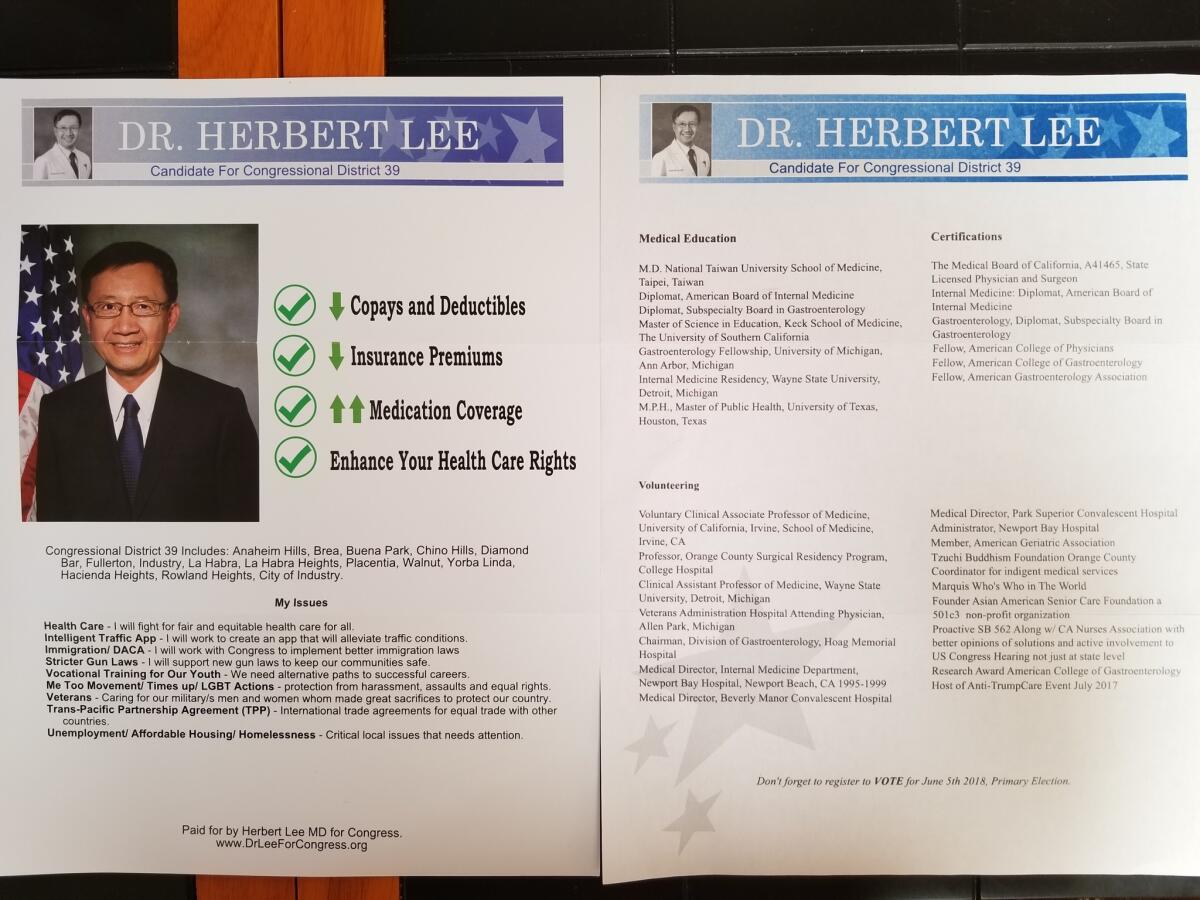
It was a crowded field in the 39th Congressional District, to be sure.
Drawn to a rare open seat in this diverse, well-to-do corner of Orange County, 17 candidates placed their names on the ballot to replace Rep. Ed Royce (R-Fullerton). Six of them were Democrats and, until recently, Herbert H. Lee didn’t stand out among them.
He was a political unknown who paid the filing fee to get on the ballot but raised virtually no money. His fellow Democratic opponents had already spent millions and had been running for the better part of a year.
But with weeks to go before the June 5 primary, Lee, a gastroenterologist, pumped $1 million into his campaign coffers and spent most of it.
Who was this mysterious candidate with little presence on social media or on the streets? Amid rising concerns that California’s top-two primary system could lock Democrats out, party operatives began to worry Lee was a potential spoiler who could sap votes from top contenders and keep them from advancing.
His campaign spending — much of it on Chinese language and Spanish advertising — seemed hyper-targeted to Asian Americans and Latinos in the district. His website and mailers, cheap looking and basic, offered vague policy positions and emphasized his personal biography — his wife’s name, the ages, occupations and college majors of his children, and that he is a “well respected Catholic family man.”
“At this point, any under-performing and virtually unknown Democrat spending last minute money is harming Democrats’ chances,” said Drew Godinich, spokesman for the Democratic Congressional Campaign Committee, the weekend before the primary.
Lee only registered to vote as a Democrat in Los Angeles County in November. He told state officials that he’d registered in Orange County as a voter, but election officials there said they had no record showing he had. Voting records prior to last week’s election suggest he hadn’t voted in California in the last 10 years. Lee’s campaign did not return repeated calls for comment.
His last-minute campaign spending also raised some eyebrows.
The biggest chunk of it — some $162,000 for “campaigning” — was paid to a Delaware company called “Alpha Elephant Data” with an address for a suburban mailbox store. No such company is registered in that state, but an “Elephant Data LLC” can be traced to an Ivy Vernon of Omaha, who registered the company in February.
Vernon, who goes by Yuyan Vernon, told The Times she is a part owner of Elephant Data and that the firm provided Lee’s campaign with voter and consumer data for targeting. The company’s website says it specializes in “conservative campaign solutions.”
In 2016, Vernon donated $5,000 to the Republican National Committee and more than $2,300 to the Donald Trump campaign. She also donated $900 to a federal political action committee run by the California Republican Party. She’s also been quoted as a member of the Chinese Americans for Trump movement, founded by a man who lives in the 39th District.
Vernon, who said she’s a registered Republican, said she sees no conflict in working with Lee. “We always want to promote Asian candidates to get more involved in political campaigns,” she said. “Dr. Lee is a really nice person … He believes in bipartisanship in a lot of his policies. This is not just Democrat, Democrat, Republican, Republican. We don’t divide people that way.”
Vernon said she had not been working for Lee very long but declined to elaborate on how they met or how she became involved with his campaign.
Vernon’s name and phone numbers are also tied to a diverse array of businesses: a corn and soybean agriculture business, an online lingerie retailer, a website selling wedding rings and a Nebraska meat processor.
The spending is curious, considering Lee’s high-spending opponents paid just a fraction for data services to firms considered industry standards in California’s expensive and competitive campaign world. Healthcare executive Andy Thorburn, a Democrat who spent more than $2.8 million in the same race, reported spending just $8,500 with Political Data, Inc., one of two data firms most candidates use. Gil Cisneros, the Democrat who ultimately made it through the primary, spent $3.9 million, but only $12,704 of it on Political Data’s services.
Depending on the level of services, most congressional campaigns in California spend between $20,000 and $50,000 for data firms.
Another company that received a large sum from Lee’s campaign was Int’l Bothwin Enterprise, which was paid $93,500 for “campaigning materials.” The company, registered with California officials as a marketing services company, has an address in an apartment complex in downtown Alhambra. A woman who opened the door there last weekend spoke limited English but said the homeowner was out of the country. Phone calls made to Grace Wei, listed as the chief financial officer of the company, went unanswered.
In the end, Lee didn’t come close to advancing in the 39th District primary. As of Sunday he was in ninth place with just 4% of the vote. But he received 4,135 votes, just 751 fewer than Mai Khanh Tran, who had been running for a year with relatively impressive fundraising and the backing of national group Emily’s List.
- Share via
Just 129 votes separate the two Democrats vying to take on Rep. Dana Rohrabacher
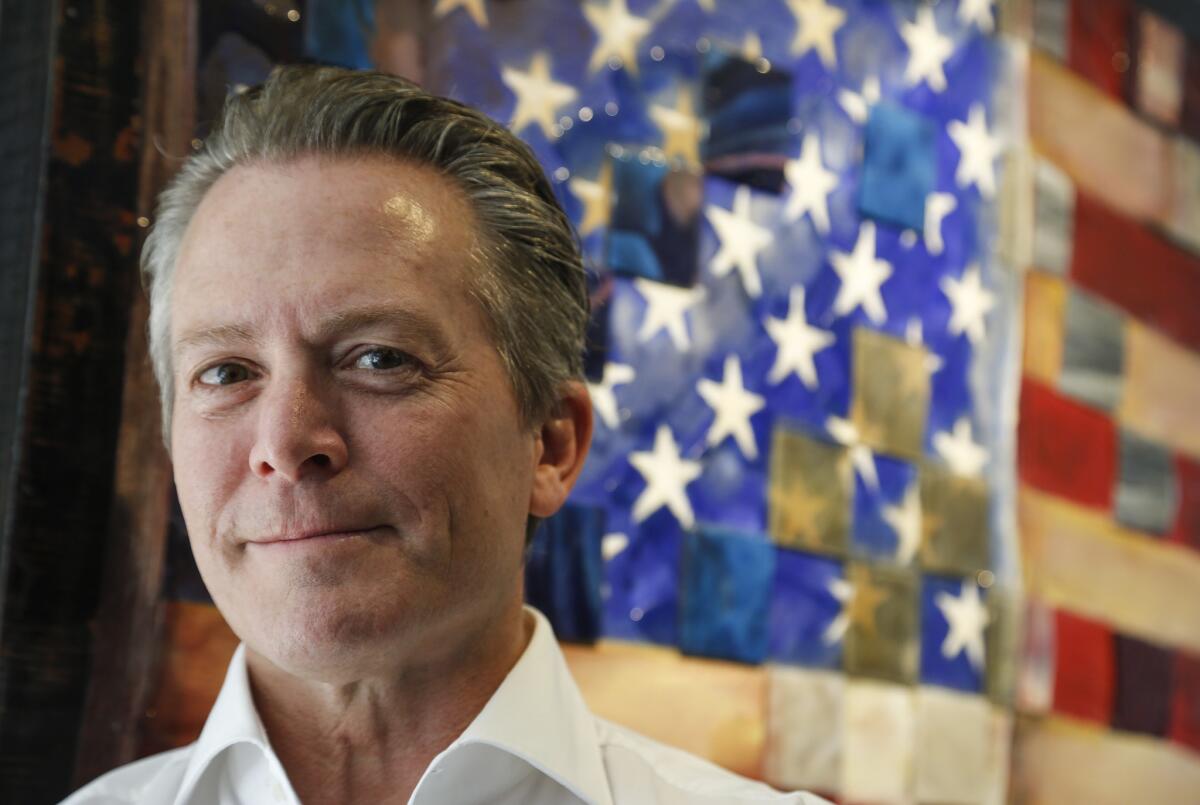
It’s pretty much certain that a Democrat will make it on the November ballot to challenge GOP Rep. Dana Rohrabacher, but as of Friday we still don’t know who.
In the latest tallies released by Orange County elections officials Thursday, stem cell scientist Hans Keirstead was just 129 votes ahead of fellow Democrat and real estate investor Harley Rouda.
That’s an increase in the lead for Keirstead, who had been ahead by just 45 votes the day before.
While national Democrats cheered the fact that their candidates appear to have advanced through California’s top-two primary in all of the key House districts they hope to flip, it would be something of a strategic failure for them if Keirstead makes it onto the November ballot.
That’s because the Democratic Congressional Campaign Committee, the national party’s arm to help candidates win House races, stepped in at the last minute to explicitly back Rouda, dropping $400,000 on joint TV and cable ads with Rouda’s campaign.
It was a clear indication that they believe Rouda, a former Republican with endorsements from a dozen House members including Nancy Pelosi, to be better positioned to take on Rohrabacher in the fall.
The committee also spent more than $1.7 million attacking Republican challenger Scott Baugh, who threatened to keep both Keirstead and Rouda out of the the November contest by snagging the second-place spot on Tuesday. That investment seems to have paid off: As of Thursday, Baugh was trailing both by more than 1,200 votes and has already conceded and endorsed Rohrabacher for the fall.
It may be days before the final winner of the second ballot spot becomes clear. As of Thursday, Orange County officials still had more than 168,000 ballots left to count and voters in the 48th District make up about a quarter of registered voters there.
On Tuesday, the Rouda campaign made a statement declaring victory, but by Thursday afternoon was asking his donors to contribute to a “Harley Rouda Recount Fund.” Rouda campaign manager Mike McLaughlin said the fund was the “legally responsible” thing to do as the vote canvass continues and that the campaign is using the funds to pay several attorneys who are observing the county’s vote-counting process.
“We’ll retain every right to pursue all options here to make sure that everything happens legally,” McLaughlin said. “We fully intend to be ahead on the count by the end of this.”
In a statement provided by his campaign, Keirstead said he’s “committed to protecting the integrity of the vote,” but that “regardless of the outcome, a Democrat gets to face Dana in the fall.”
DCCC spokesman Andrew Godinich also pointed out another bright spot for Democrats: Rohrabacher received just 30% of the primary election vote, the lowest share of any congressional incumbent in California. Keirstead and Rouda both had about 17%.
- Share via
Kevin de León lost his own state Senate district in Tuesday’s U.S. Senate primary
Democratic state Sen. Kevin de León has represented part of Los Angeles in Sacramento for more than a decade, but he failed to secure a majority of votes on his home turf in the U.S. Senate primary this week.
With 2 million votes left to be counted, it’s an early indicator of how difficult the former state Senate leader may find it to challenge Sen. Dianne Feinstein, who has represented California in Washington for over a quarter of a century.
The preliminary, uncertified results show De León received 34% in the 24th Senate District. Feinstein won the district with 44%.
He received 65.8% of the vote in 2014, the last time he was on the ballot for reelection to the state Senate district.
Feinstein won Los Angeles County outright with 49% of the vote, and De León received 16% of the vote.
De León said he knows he must overcome hurdles of his lack of name recognition statewide. “I recognize that the vast majority of Californians don’t know me,” he said in an interview this week. “This is the opportunity now to get to know the voters.”
The state senator secured the No. 2 spot on the ballot Tuesday with just 11% of the vote statewide. Even with a crowded ballot, Feinstein claimed the top spot with 44%. The votes closely track polls of the race and reflect he has an uphill climb as the two embark on a Democrat-vs.-Democrat contest this fall.
Asked about the district result, the De León campaign took an aggressive approach, with spokesman Jonathan Underland suggesting it was an “embarrassment” that Feinstein, “a 25-year incumbent with almost 100% name ID couldn’t get more than 50% of the vote statewide.”
- Share via
Trump and taxes will dominate the governor’s race for the next five months
Gavin Newsom and John Cox see eye-to-eye on very little — and Californians can expect to hear plenty about those disagreements from now until November.
With the contours of the gubernatorial election exactly five months from now set as a matchup between Newsom, the Democratic lieutenant governor and former mayor of San Francisco, and Cox, the Republican businessman based in Rancho Santa Fe, voters are in for a partisan battle that will litigate the state’s recent gas tax — now under siege by a repeal effort — and competing visions of how to address California’s high cost of living.
And above all, Donald Trump, whose polarizing presidency has turned nearly every electoral contest into a referendum on the current administration.
- Share via
Republican Diane Harkey, Democrat Mike Levin will compete for Darrell Issa’s House seat
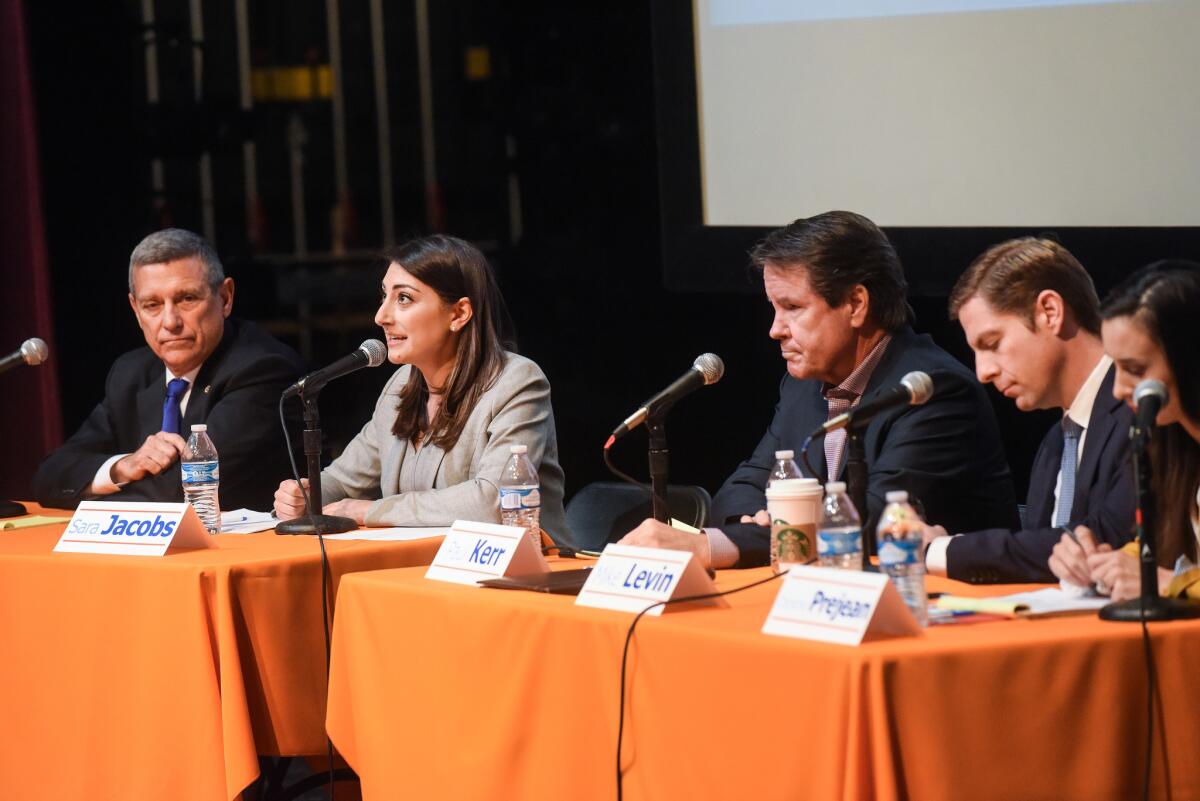
Democrat Mike Levin has advanced to the general election and will take on Republican Diane Harkey in the race to replace GOP Rep. Darrell Issa in the 49th Congressional District.
The district — which includes southern Orange County and northern San Diego — is one of Democrats’ biggest pickup opportunities.
Issa won reelection by just 1,621 votes in 2016, the closest reelection of any House member that year. After that, Democratic activists in the district were energized, holding weekly rallies outside Issa’s office for more than a year and spending months registering and reaching out to voters.
After Issa’s retirement announcement, the primary field became one of the most volatile in the state. Wide candidate fields on both sides prompted concern that either party might be locked out of contention for the seat in the fall due to the state’s top-two primary.
In the end, Levin, an attorney who had received endorsements from more than half a dozen members of Congress and several progressive groups, was able to squeak through.
As of Thursday evening, Levin had a 2,289-vote lead over fellow Democrat Sara Jacobs, who had spent more than $1.8 million, most of it her own money, to move the needle in her favor. So far, Harkey, chair of the state tax board with significant name recognition in the district, has 25.5% of the votes while Levin has 17.4%.
The top-two threat prompted a flood of outside spending approaching $6 million, the most of any House race in the state. Most of that came from a SuperPAC run by Emily’s List, the abortion rights group backing Jacobs. (Jacobs’ grandfather, Qualcomm co-founder Irwin Jacobs, contributed more than $1.2 million to the group.)
The Democratic Congressional Campaign Committee spent more than $1.6 million knocking down Republican assemblyman Rocky Chavez, who was seen as a major threat to Democrats’ chances of fielding a candidate here in the fall. It seemed to have worked: Chavez had less than 8% of the vote as of Thursday evening.
- Share via
Democrats look likely to get locked out of this Republican-held congressional district in California
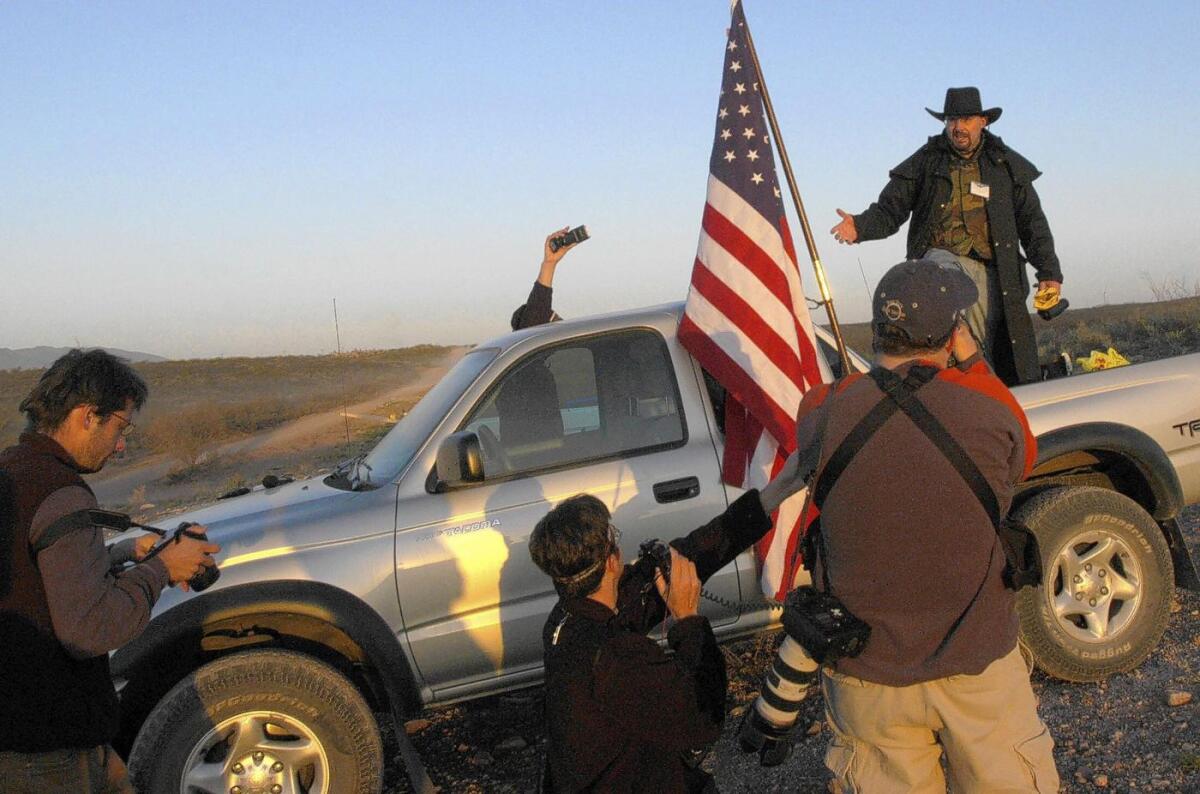
Democrats appeared to largely dodge a major threat in California by securing spots on the ballot in almost all of the competitive House seats they want to win in order to retake control of Congress.
But, so far, it looks like the party will be locked out of a Republican-held seat in the eastern desert portion of the state. Incumbent Paul Cook (R-Yucca Valley) and former Assemblyman Tim Donnelly, who previously challenged Cook, are in the top two slots.
Though the district was not officially targeted by Democrats, Marge Doyle raised a serious amount of money in her campaign. But she’s looking like the odd candidate out in the GOP-leaning district, where 37% of voters are registered Republicans, 32% are Democrats and 22% have no party preference. Voters backed President Trump over Hillary Clinton by a margin of 15 percentage points in the district two years ago and Cook was reelected 62% to 38%.
Donnelly finished third in the 2016 primary by less than 1,500 votes.
Donnelly, a former Republican gubernatorial candidate, is also a well-known conservative radio host and former leader in the Minuteman border patrol group.
“He is one of the very few people alive who could make Donald Trump look like a moderate on immigration,” John J. Pitney, a political science professor at Claremont McKenna College, told the Los Angeles Times in 2016.
- Share via
After his first-place finish, Gavin Newsom has kind words for Cox and Villaraigosa
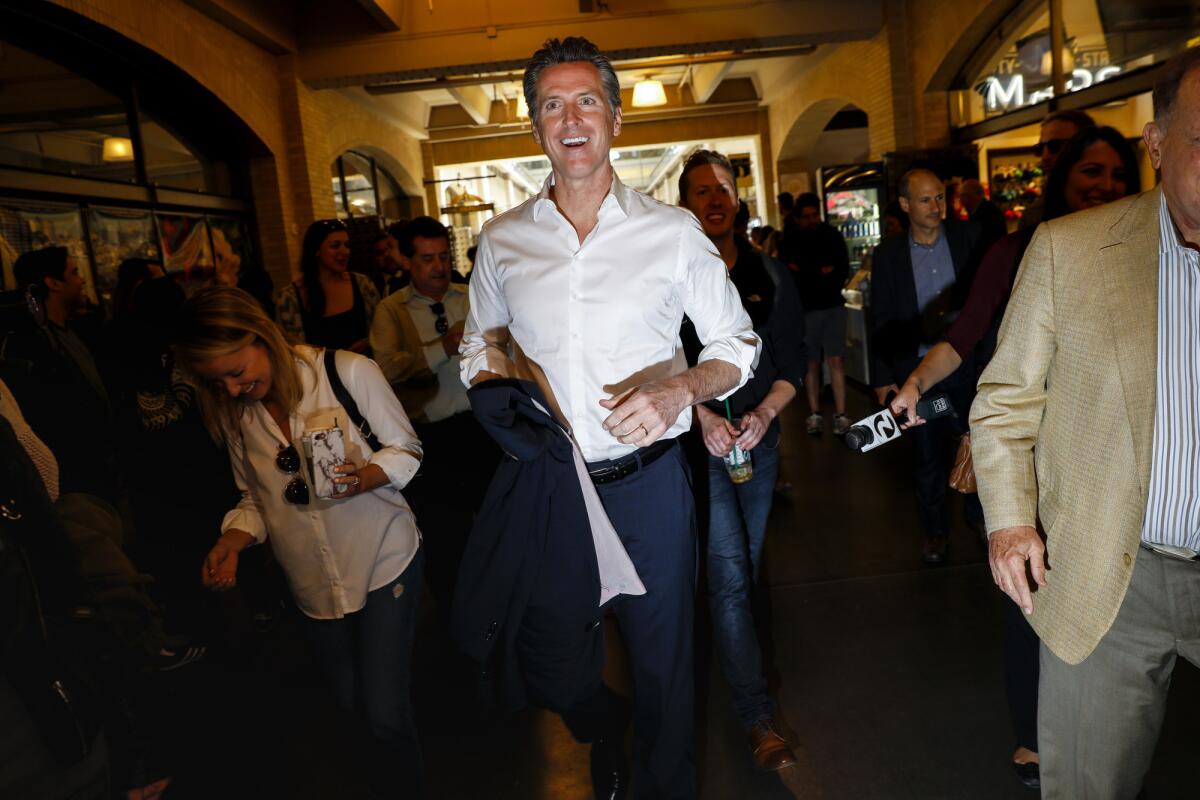
Lt. Gov. Gavin Newsom, fresh off his first-place showing in yesterday’s primary election, was in a chipper enough mood on Wednesday to lavish his competitors with compliments.
On Antonio Villaraigosa, his closest Democratic opponent whose backers drew Newsom into a costly battle on the airwaves, the lieutenant governor was insistent the campaign left no hard feelings.
“I’ve long respected Antonio — and I mean that,” Newsom told reporters at San Francisco’s Ferry Building Marketplace. “Listen, he’s a competitive guy, he’s got incredible political talent.”
Newsom said he and Villaraigosa played phone tag Tuesday night and have yet to connect directly. But he took pains to emphasize that he really, truly does like the former Los Angeles mayor.
“Everything I just said, I mean,” Newsom said. “That’s not just a politician. I’m serious.”
He did speak Tuesday night to John Cox, the Republican businessman he will square off against in November. On Wednesday, Newsom had kind words for Cox as well.
“Full disclosure: I like John. We spent a lot of time together on the campaign trail,” Newsom said. “I think he’s a good guy. And I’m not going to run a campaign that’s scorched earth.”
He still left himself some wiggle room for a heated battle.
“You see how these things go. I’m not going to act holier-than-thou,” Newsom said. “But I don’t intend to.”
Newsom said he does intend to debate Cox one on one, returning to a common refrain linking Cox to President Trump.
“I’m happy to [debate],” Newsom said. “Bring Donald Trump to the debate!”
And he reiterated his call for Trump to visit California to in the lead-up to the November election, clearly hoping such an appearance would energize the Democratic base.
“If he wants to spend time, he should spend time here,” he said. “I think it’d be good. It’d be good for the downballot races as well.”
- Share via
See which California counties voted Democrat, and which voted Republican, in governor’s race
Democrat Gavin Newsom and Republican John Cox will face off in the November election for governor. An analysis of voting results shows which counties voted heavily for a Democrat and which favored a Republican in that race.
- Share via
Why we won’t know voter turnout in Los Angeles until Friday, or maybe even later

The rise in voting by mail has made it much tougher for local governments to calculate voter turnout.
The rise in voting by mail has made it much tougher for local governments to calculate voter turnout. That challenge is magnified in places such as Los Angeles County, where a majority of votes could be cast by mail in this election.
As such, it takes more time.
As of early Wednesday, county officials had counted just over 952,633 ballots. Of those, about 30% were mail ballots.
The nation’s most populous county is home to more than 5.1 million registered voters. And of those, about 42% are permanent vote-by-mail voters, meaning brace yourself for a long week.
Let’s be honest, if past midterm primaries are any guide, in Los Angeles County the final turnout for Tuesday’s election will be underwhelming.
In 2014, in Los Angeles County, just 17.1% of registered voters cast ballots, either in person or at the polls. It was the lowest showing for a midterm or presidential election in L.A. County since at least the 1940s.
You can track the votes here.
The county will continue to count ballots throughout the month, ending with the county Board of Supervisors certifying the vote in early July.
- Share via
Stacey Dash’s political career ended before it began. But there’s more drama in this California congressional race
Stacey Dash may have called it quits on her congressional run, a quick flameout from the “Clueless” actress-turned-conservative commentator who heated up an otherwise placid reelection bid by freshman Rep. Nanette Barragán (D-San Pedro).
Could the contest be getting interesting again?
Compton Mayor Aja Brown jumped into the race as Dash brought the bright attention of celebrity blogs to California’s 44th Congressional District in February. She said Dash was a motivating factor in her decision to jump in the race.
The excitement was short-lived. Dash bowed out, followed shortly by Brown, who said at the time she wanted to focus on her family because she is expecting her first child.
Both Dash and Brown were on Tuesday’s ballot. Let’s see how they did:
With lots of mail-in ballots still left to be counted, Brown appears poised to join Barragán on the November ballot in a Democrat-versus-Democrat match-up — even though she never ran a campaign.
That could be because of her high profile at the local level. Either way, she’s faced with a new decision.
Asked if the mayor is considering relaunching her campaign, a Brown spokeswoman said she had no comment at this time.
Registered Democrats outnumber Republicans in the district, 61% to 10%.
- Share via
California’s major political parties feared the top-two primary but emerged as powerful as before
California’s most wide-open primary in two decades ended Tuesday with contests from governor to seats in the U.S. House that seemed focused, even fixated at times, on the race for second place.
The rules of the top-two primary — in which a cluster of candidates gets whittled down to two semifinalists — seemed almost to eclipse everything else about the campaigns being waged this year.
Gamesmanship was everywhere. Could a feared opponent be shut out of a spot on the fall ballot? Might a political party’s leaders convince some hopefuls in crowded races to step aside and thus avoid splitting the vote?
- Share via
Actor Antonio Sabato Jr. advances in California House race
Actor and model Antonio Sabato Jr. has clinched second place in the race for a congressional seat to represent most of Ventura County.
Sabato, a vocal supporter of President Trump who spoke at the 2016 GOP national convention, was leading fellow Republican Jeffrey Burum by more than 2,000 votes Wednesday morning when the Associated Press called the race.
Sabato, who appeared on the ballot simply as Antonio Sabato, will face incumbent Democrat Julia Brownley, who had more than double Sabato’s vote tally in the primary as of Wednesday morning.
Earlier this year, Burum, a retired Air Force major, had called on Sabato to end his campaign, saying movies where Sabato simulated sex with a man and appeared nude were “pornography” that made him unfit to represent the GOP in Congress.
- Share via
Democrats avoid a shutout in key race to replace retiring Rep. Ed Royce
It will be Republican Young Kim against Democrat Gil Cisneros in the race to replace Rep. Ed Royce of Orange County in November.
The Associated Press said Wednesday morning that Cisneros, a Navy veteran-turned-multimillionaire, had finished second in a crowded field in the 39th District. He was garnering 19% of the vote.
Kim, a former Royce staffer who had received his endorsement, clinched a spot in the runoff Tuesday night. She had 22% of the tally, and was slightly more than 2,000 votes ahead of Cisneros on Wednesday morning.
Former state Assemblywoman Kim, who had the benefit of name recognition in a district where she represented about a quarter of its constituents, had led several internal polls from both parties and was expected to easily clinch one of the top two spots.
She’d raised nearly $1 million as of May 16, and Cisneros, a lottery winner, raised millions as well, a lot of it self-funded.
With 20 candidates on the ballot and nine Democrats splitting the vote, this race was one of the top concerns for Democrats. They feared that California’s top-two primary, which advances the top two vote-getters regardless of party, could send two Republicans into the general election in this crucial seat.
Citing the top-two problem, election handicapper Cook Political Report had recently downgraded Democrats’ chances of flipping this seat but still considered it a tossup. As a result, the race attracted $16.7 million from outside groups and candidates trying to jockey for position. About $1.9 million was spent by Democratic groups trying to suppress votes for lower-tier Republicans like Orange County Supervisor Shawn Nelson and former state Sen. Bob Huff, hoping to prevent them from taking the No. 2 slot. Another $8 million of that came from three wealthy Democratic candidates fighting each other to get through.
The sparring got especially intense between Cisneros, who eventually earned the backing of national Democrats, and health insurance executive Andy Thorburn, prompting state Democratic party chair Eric Bauman to broker a truce between the two in the closing weeks of the campaign.
- Share via
Rep. Mimi Walters will face Katie Porter in central Orange County’s 45th District
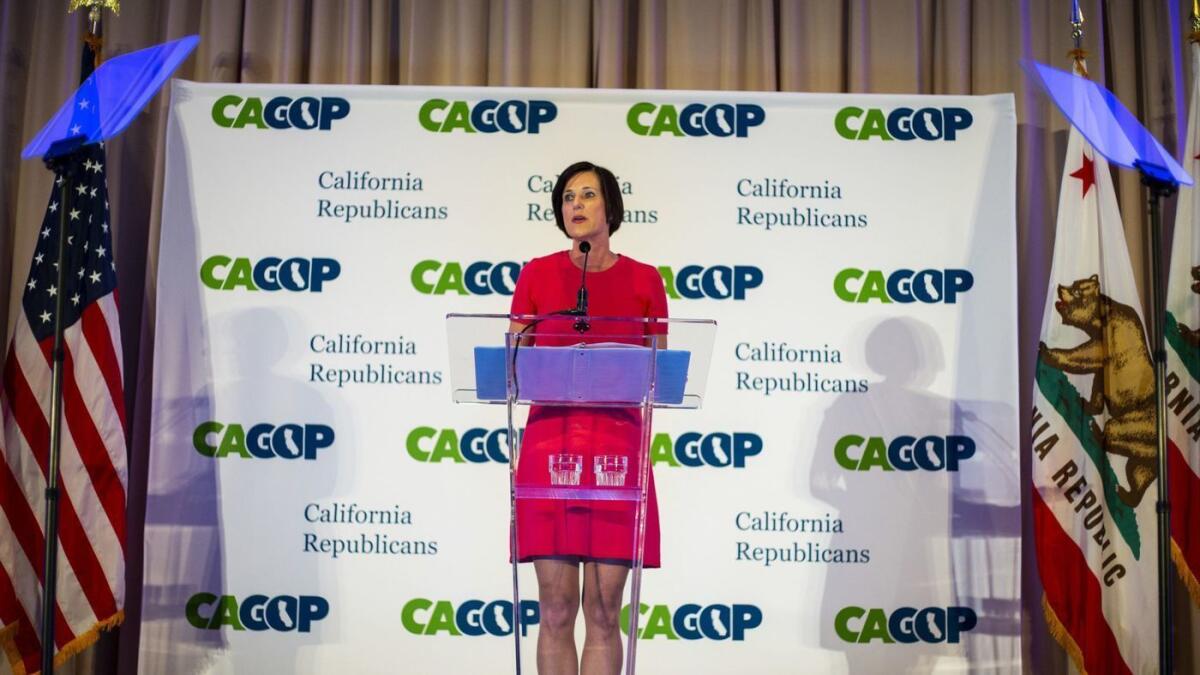
Katie Porter will challenge GOP Rep. Mimi Walters in November, setting up a pitched battle in a crucial House district.
Walters, first elected in 2014, represents one of the seven GOP-held districts Democrat Hillary Clinton won over President Trump in 2016. Four Democrats were on the ballot Tuesday fighting for a chance to unseat her this fall.
The primary fight on the left mostly came down to Porter and Dave Min, both UC Irvine law professors who spent the closing weeks of the campaign attacking each other.
Min ran ads accusing Porter and fellow Democrat Brian Forde of inflating their credentials and benefiting from “special interest” money. (The independent expenditure arm of abortion rights group Emily’s List spent more than $240,000 to boost Porter’s bid.) Porter has criticized Min for having the backing of the moderate New Democrats Coalition and “siding with corporate interests.”
As Min and Porter have duked it out, Walters has been able to stockpile cash and stay mostly above the fray. As of May 16, the final report before the primary, Walters had nearly $1.6 million in the bank, one of the highest figures of any GOP incumbent in the state and more than $1 million more than her nearest competitor.
She has sounded the alarm for fellow Republicans, urging them to take their challengers seriously. “The Democrats think there’s no stopping them this time,” she told a crowd at the California Republican Party convention in May. “They’re not just coming for any one of us, they’re coming for all of us.”
Walters has been at the forefront of an effort to repeal a recent increase in the state gasoline tax, an issue Republicans hope can help them boost turnout if the measure qualifies for the ballot in November.
- Share via
Ammar Campa-Najjar advances to face embattled Rep. Duncan Hunter in November
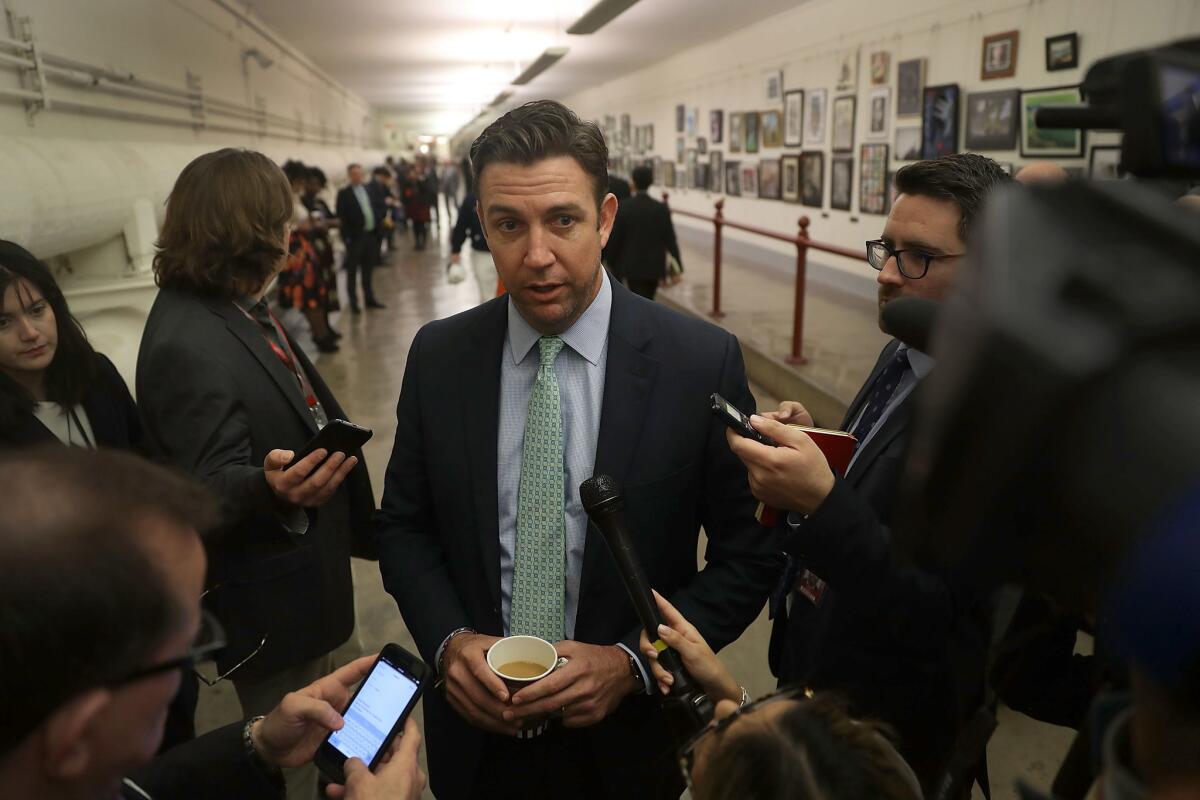
Ammar Campa-Najjar will take on embattled GOP Rep. Duncan Hunter in inland San Diego County’s 50th Congressional District.
Democrats have taken aim at Hunter’s district even though it’s unfriendly territory on paper: Registered Republicans outnumber Democrats by 15 percentage points, and President Trump won here in 2016 with 55% of the vote.
But an ongoing criminal investigation into Hunter’s campaign spending, which included payments to nail salons, his children’s private school and an airline that flew his family rabbit, has boosted their hopes. Hunter’s fundraising cratered at the end of last year, when he raised just $50,000 in three months. He has spent a good deal of his campaign coffers on legal fees and earlier this spring filed paperwork to form a separate legal defense fund.
As of May 16, he had just $315,000 in cash on hand, still about $100,000 ahead of his closest rival, school board trustee and former Navy SEAL Josh Butner.
Democratic activists had been split mostly between Butner and public affairs consultant Campa-Najjar.
The addition of Republican El Cajon Mayor Bill Wells to the field prompted concerns from Democrats that neither of their top candidates would advance in California’s top-two primary. But with behind-the-scenes help from Duncan Hunter Sr., Hunter’s father who preceded him in Congress, Wells failed to gain much traction.
A major issue looming over the race is whether Hunter could be indicted mid-campaign. The investigation appeared to intensify earlier this year, with a grand jury subpoena issued in January.
- Share via
Kevin De León earns second spot on U.S. Senate ballot, challenging Dianne Feinstein
For the second statewide election in a row, California voters will choose between two Democrats for the U.S. Senate in November.
State Sen. Kevin de León of Los Angeles placed second in the top-two primary, earning a spot on the general election ballot with Sen. Dianne Feinstein.
The two Democrats will square off on Nov. 6 in a contest that pits Feinstein’s decades of political strength as a moderate against De León’s potential appeal to progressives and Latinos.
De León enters the general election with a decisive fundraising disadvantage. Feinstein raised nearly $13 million ahead of the primary, including $5 million of her own money she lent to her campaign. That allowed her to run television ads across California in the final weeks of the campaign and still have a $7-million war chest heading into the general election, nearly 10 times as much as what De León had in the bank as of March 30. He’s raised just over $1.1 million since he began campaigning last fall.
Check out some of our previous coverage on the Senate race:
Why centrist Dianne Feinstein is moving so much to the left that she now opposes the death penalty
Kevin de León’s plan to take on Dianne Feinstein starts with finishing second
California Democrats’ snub of party icon Dianne Feinstein could be a speed bump — or a signal
- Share via
John Cox says November race against Newsom is ‘Venezuela’ vs. ‘California Dream’
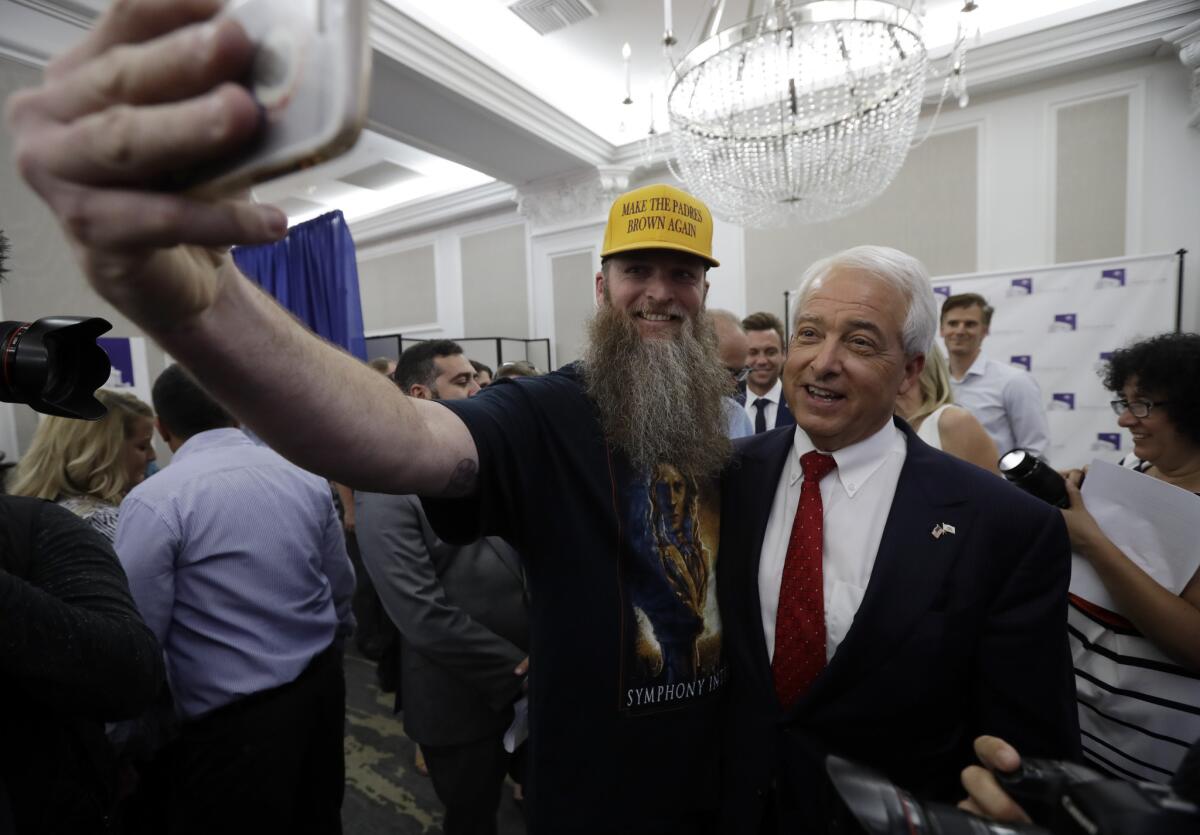
Fresh off a strong second-place showing in Tuesday’s California gubernatorial primary, Republican businessman John Cox said his opponent in November is supporting left-wing policies that will turn the state into a failed regime.
“This debate is going to set up a clear choice between Venezuela, which is what (Lt. Gov.) Gavin Newsom wants California to look like, and the California Dream, which I want to restore,” Cox said on Fox News on Wednesday morning.
Newsom, a Democrat, is the heavy favorite to defeat Cox in November in a state where Democrats overwhelmingly outnumber Republicans. Cox criticized Newsom for backing liberal immigration and taxation policies that he said would turn California into Venezuela, the South American country that is collapsing under autocratic rule with energy and food shortages.
Cox also praised President Trump, who provided a spark to his campaign in the final weeks by tweeting an endorsement. Cox likened his chances in California to Trump’s unexpected presidential victory two years ago.
“All around the world people are rising up against corruption in government,” Cox said.
Earlier Wednesday, Trump congratulated Cox for his No. 2 finish and took credit for helping him get there.
- Share via
Rohrabacher gets props from Trump
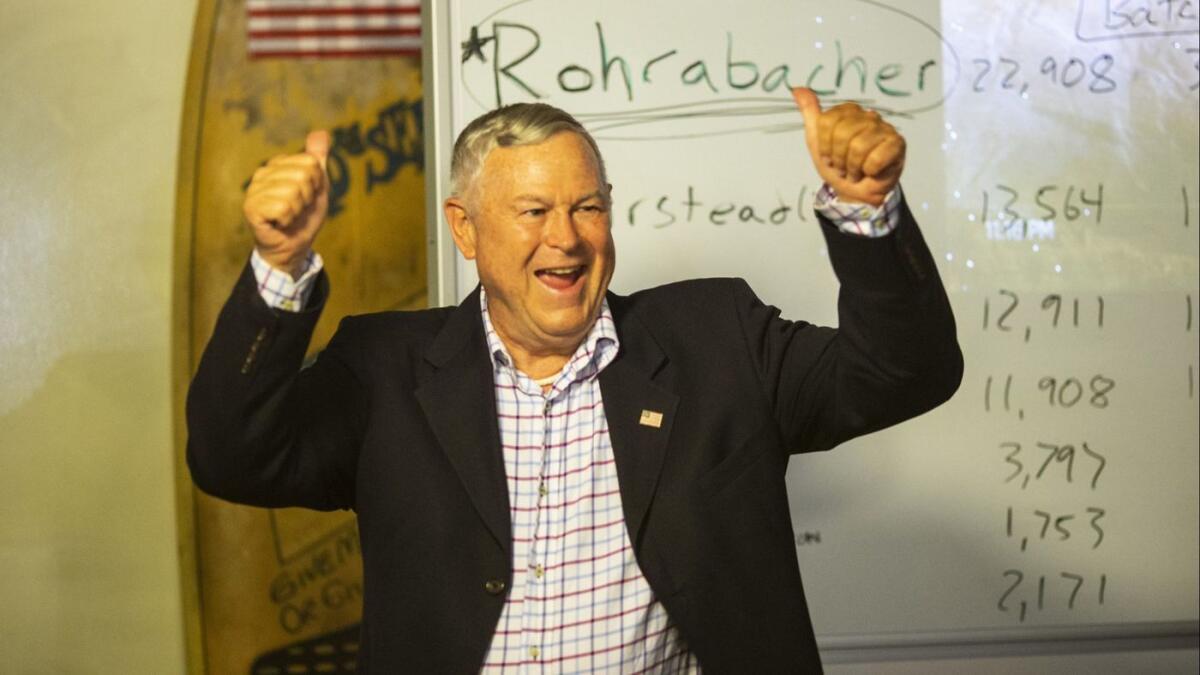
President Trump tweeted his support for Rep. Dana Rohrabacher on Wednesday morning after the Costa Mesa Republican finished first in Tuesday’s primary voting.
“We are proud of you, Dana!” the president wrote.
It’s still unclear who Rohrabacher will face in the November election. Two Democrats, Harley Rouda and Hans Keirstead, and another Republican, Scott Baugh, were closely locked in the race for second place.
Trump’s congratulations will likely raise eyebrows among his critics. Rohrabacher has been called “Putin’s favorite congressman” for his outspoken support of Russia. He has not been accused of any wrongdoing, but his name has occasionally surfaced in connection with the special counsel investigation, which Trump has denounced as a “witch hunt.”
- Share via
Trump congratulates GOP gubernatorial candidate John Cox
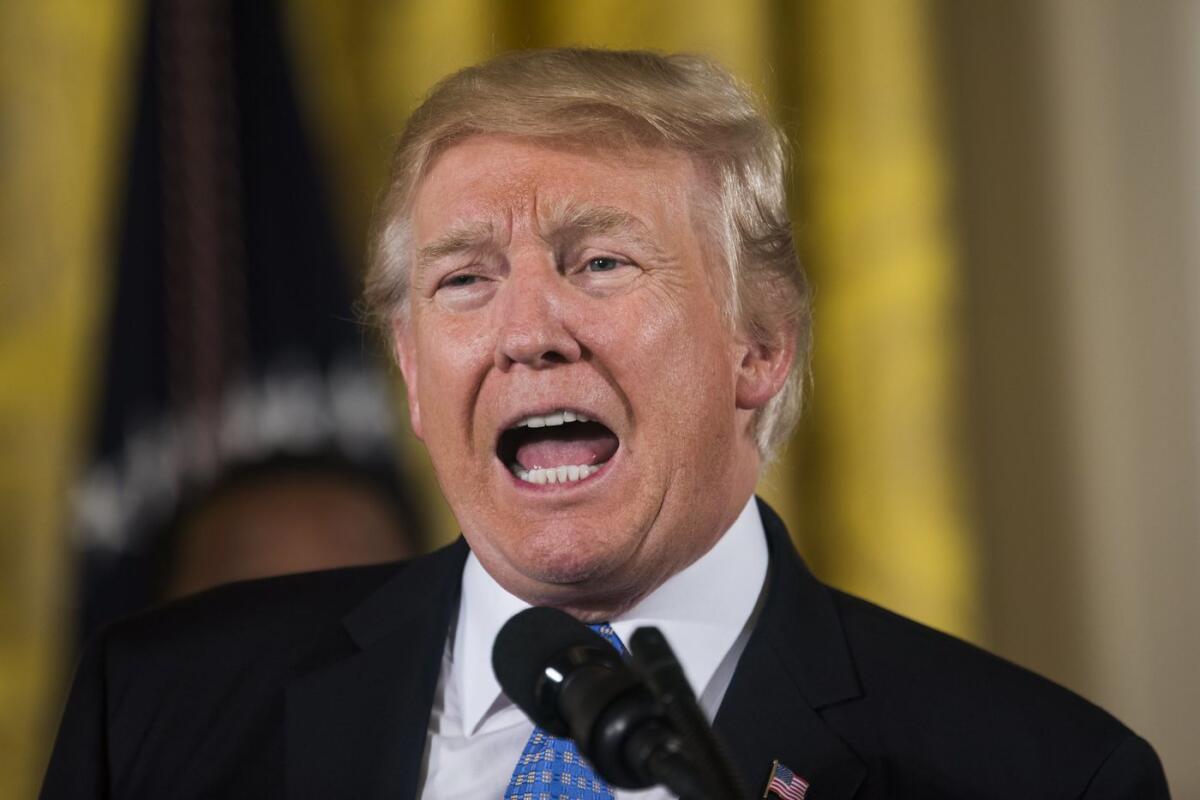
President Donald Trump touted Republican businessman John Cox’s second-place finish in California’s gubernatorial primary.
Trump had sent off a series of tweets in the final weeks of the campaign to boost Cox, a perennial candidate who spent millions of his own money in the race. Cox on Tuesday night bested former Los Angeles Mayor Antonio Villaraigosa, a Democrat.
Cox will face Democratic Lt. Gov. Gavin Newsom, who is a heavy favorite, in November. But a Republican’s appearance in the gubernatorial runoff will likely drive GOP turnout in the state, which could be pivotal in House district races that will help determine control of Congress.
- Share via
Tony Cárdenas easily takes first in congressional primary despite molestation lawsuit
Rep. Tony Cárdenas easily topped a five-way field of candidates Tuesday, despite facing a lawsuit accusing him of child molestation.
Cárdenas, a Democrat from the San Fernando Valley, had earned support from more than two-thirds of voters in his district based on tallies as of Wednesday morning. Republican Benny Bernal was in second place with 18% of the vote.
The suit alleges that Cárdenas groped a 16-year-old girl in Los Angeles more than a decade ago. The congressman has vigorously denied the claims, saying that they were the invention of a former staff member. No public evidence has emerged to support the lawsuit’s claims, and The Times has been unable to corroborate any of the allegations.
Cárdenas appears to have received stronger support in his district than in the primary two years ago. In June 2016, Cárdenas garnered 61% of the vote among five candidates including former Los Angeles City Councilman Richard Alarcon, a Democrat. Cárdenas trounced Alarcon in the general election.
- Share via
Democrats look like they won’t be shut out of critical California House races
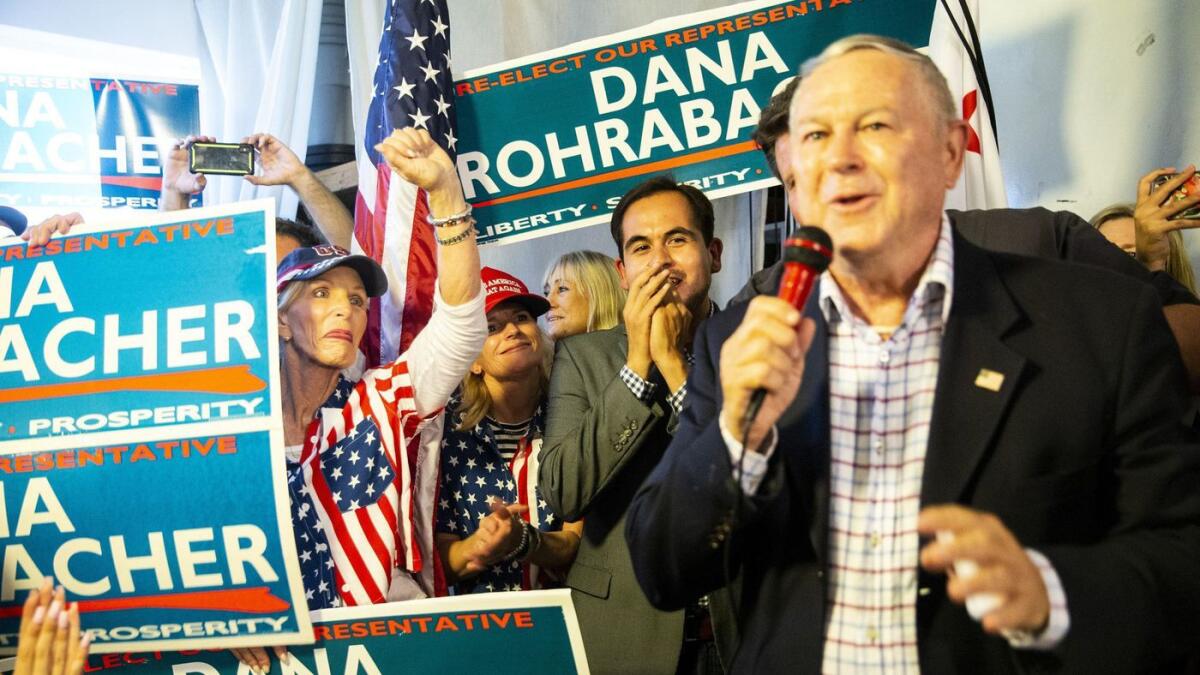
Democrats in California appeared poised Tuesday night to avoid getting shut out of key congressional races for the November election, the most pressing risk they faced as they seek to retake control of the House.
With most precincts reporting, Democrats seemed to have captured second place in the contests where the threat was most acute.
The party’s wide, boisterous field of candidates could have locked them out of multiple races because of the state’s unique primary, which advances the two candidates with the most votes regardless of party.
- Share via
GOP Rep. Tom McClintock and Democrat Jessica Morse advance in race for Sierra Nevada district
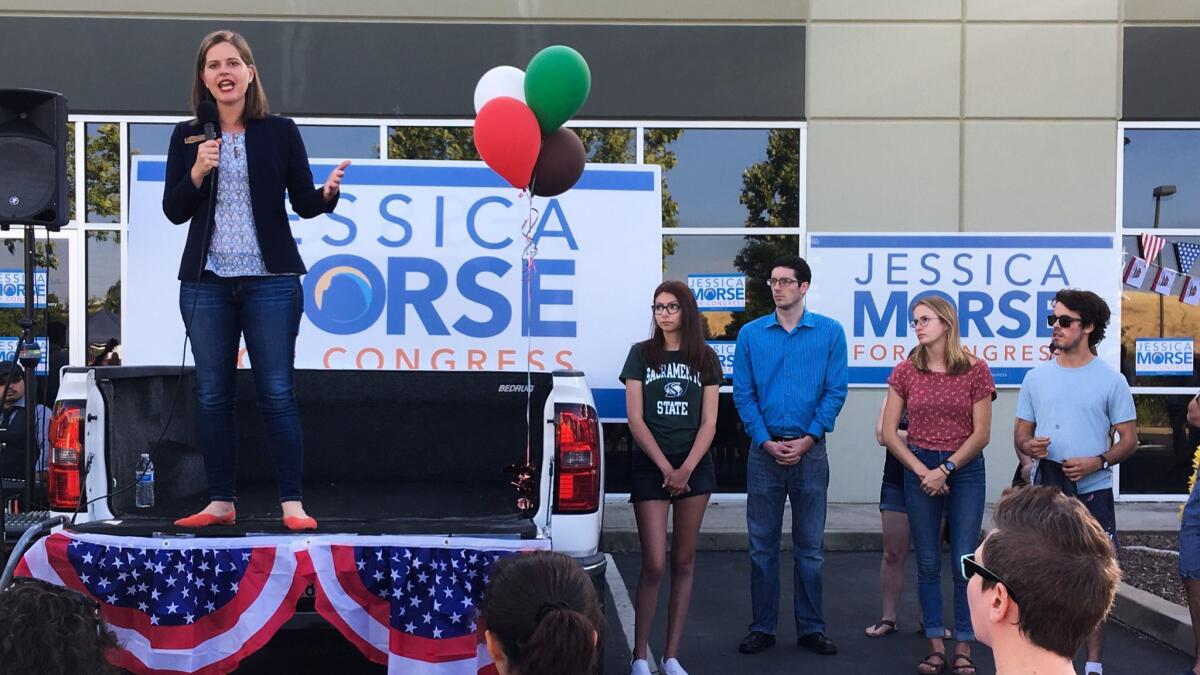
GOP Rep. Tom McClintock and Democrat Jessica Morse advanced to the general election after a tight California primary race that left Democrats brimming with hope.
McClintock collected 52% of the vote, while Morse collected 20%. Democrat Regina Bateson, a Roseville native and MIT professor, came in third with 13% of the vote.
In a statement Wednesday, McClintock said he was overwhelmed by “the resounding vote of confidence” given to him by people in the Sierra Nevada district.
Morse said nothing could erase the enthusiasm awakened by her campaign.
“A year ago, I launched my campaign for Congress because I believed that the 4th Congressional District deserved a representative who would put the important issues facing our community first,” she said in a statement.
Democrats have felt energy building in this northeastern California district, though it boasts the highest percentage of registered Republicans in the state. McClintock attracted four Democrats and one Republican as challengers in Tuesday’s primary.
Morse raised more than $1 million and ending her last quarter with more cash in the bank than McClintock, who’s been in office for nearly a decade. She won the endorsement of the California Democratic Party despite some infighting with other Democrats in her race.
Buoyed by opposition to Trump, activists have confronted McClintock at town hall meetings, protested outside his office and knocked on doors in the suburban Sacramento County neighborhoods dubbed the “Orange County of the north.”
Many Democrats in the district said they haven’t been this excited since Democrat and retired Air Force Lt. Col. Charlie Brown ran in 2006 and 2008, before the district was significantly redrawn. Brown first came within 3 percentage points of victory against the former Republican incumbent, Rep. John T. Doolittle, who was mired in an ongoing investigation into an influence-peddling scandal involving former Republican lobbyist Jack Abramoff.
Later, Brown unexpectedly came within a .5% margin of McClintock, who succeeded Doolittle in 2009 and hasn’t faced serious opposition since. In 2016, McClintock was reelected with 63% of the vote.
- Share via
Rep. Devin Nunes will face Andrew Janz in the Central Valley’s 22nd District
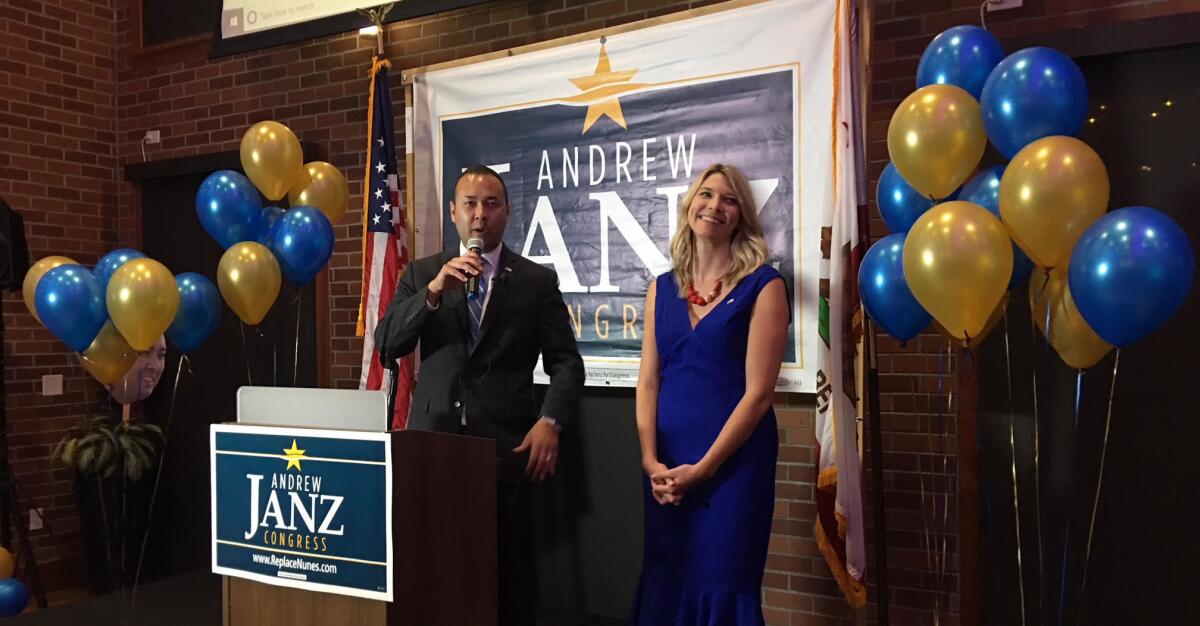
After a series of high-profile fights in which Rep. Devin Nunes gained national fame over the House’s investigation into Russian election meddling, the Republican incumbent collected 58% of the vote in California’s primary election with 97% of precincts reporting.
He will face Democrat Andrew Janz, a county prosecutor, who as of mid-May had raised almost $2 million as cash poured into his campaign from around the country from those who want to counter Nunes.
Janz, who collected 32% of the vote, will be running an uphill battle for Nunes’ House seat in a district where registered Republican voters outnumber Democrats by 10 percentage points and Trump won with 51% of the vote in 2016. He has not been shy about employing mockery to get his anti-Trump message out: Late last year, Janz bought a highway billboard near Jimbo’s Bar in Clovis depicting Nunes and Trump clad in diapers, with Russian President Vladimir Putin pulling them by leashes.
Nunes, a seven-term incumbent, has previously won with roughly 68% of the vote and outran Trump by 16 percentage points. He has raised nearly $5 million.
In the Republican’s hometown of Tulare, where partisan rifts reflect those across the country, many constituents aren’t following the battle. But the House Intelligence Committee chairman did fall behind in one election handicapper’s ratings in late April, giving more optimism to Democrats who hope to regain control of the House in November.
Nunes’ district was downgraded to “likely Republican” from “safe Republican” by analysts at Larry J. Sabato’s Crystal Ball at the University of Virginia Center for Politics in April.
At an election watch party in Fresno, where pop music blasted from speakers and attendees munched on churros, Marie Lamb, a 65-year-old therapist, said she couldn’t “think of one redeeming thing to say about Nunes.”
Terry Bavin, a retired nurse anesthetist, and Jim Mendez, a retired physician, criticized his record on climate, tax and healthcare policies.
“With Devin Nunes, the true American dream is dead,” Bavin said.
But they acknowledged the hurdles Janz faces, pointing to the crowd of attendees, many white retirees like themselves. Asian and Latino voters represent untapped potential, Mendez said.
“But you don’t see them come out,” he said. “This crowd is going to be a problem for him in November.”
Onstage, Janz drew applause from the audience when he told the story of how his parents met in Thailand and spoke in favor of immigration. Now that the primary is over, he said, he and Nunes can begin the debate about whose vision better serves the Central Valley.
“We are energized,” he said after his speech. “We are feeling very good moving into the general election, and I just relish the opportunity to debate Mr. Nunes.”
- Share via
Democrats poised to claim Republican-held Assembly seat in San Diego
Two Democrats rushed to an early lead Tuesday to fill an open state Assembly seat in northern San Diego County previously held by Republican Rocky Chavez.
Democrats Tasha Boerner Horvath and Elizabeth Warren each held 25% of the vote, while six Republicans split the remainder of the ballots, with 35% of precincts reporting.
If they remained the top two finishers, Horvath and Warren would advance to the general election in November. The district had a safe 9-percentage-point advantage for the GOP when Chavez was first elected in 2012, but that has slowly eroded since. Both parties are even, each with 33% of registered voters, while 27% of voters list no party preference.
Chavez, who has advocated for more moderation in politics, finished in sixth place in the race to fill a congressional seat left vacant by GOP Rep. Darrell Issa’s retirement.
- Share via
California judge in Brock Turner case removed from office
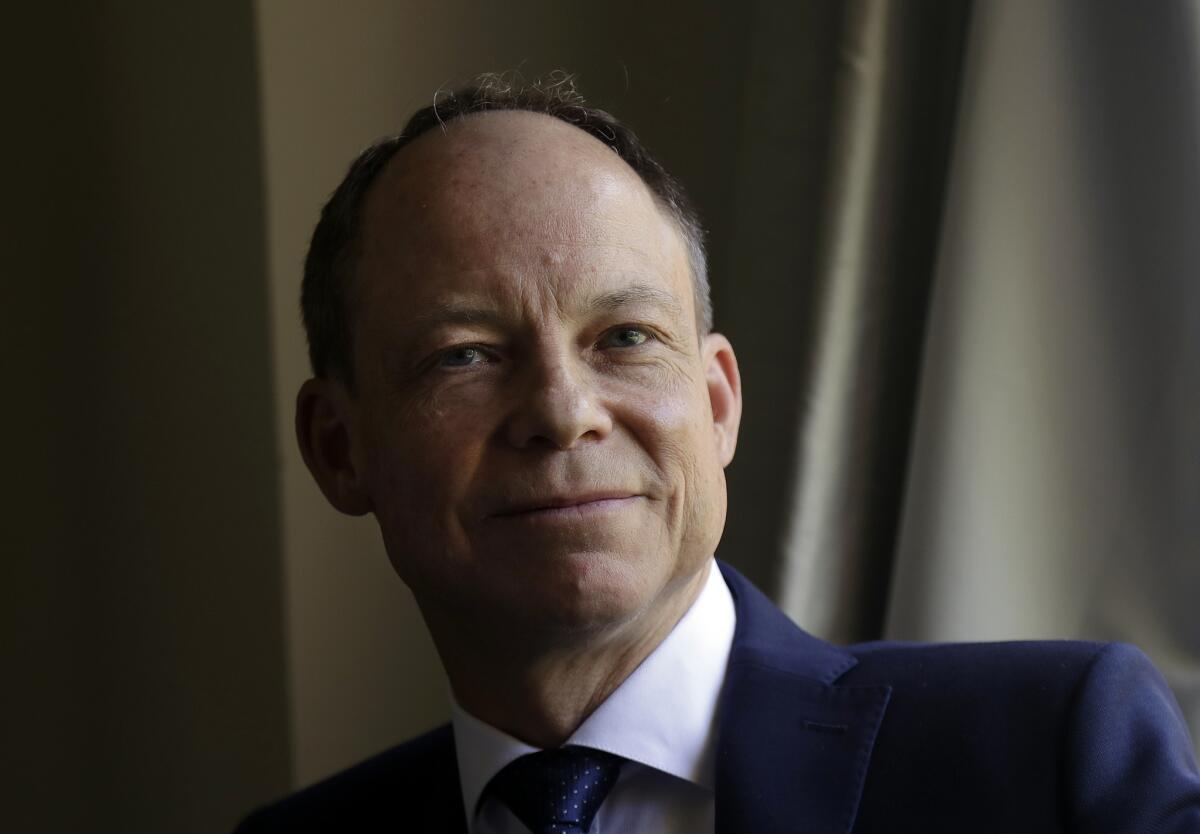
Northern California voters have recalled a judge from office after he sentenced a former Stanford University swimmer convicted of sexual assault to a short jail sentence instead of prison.
Santa Clara County Judge Aaron Persky was targeted for recall in June 2016 shortly after he sentenced Brock Turner to six months in jail for sexually assaulting a young woman outside a fraternity house on campus. Prosecutors argued for a 7-year prison sentence.
The case gained national prominence after the victim read an eloquent statement in court before Turner’s sentence. The statement circulated widely online and was read on the floor of the U.S. Capitol during a congressional session.
Turner was released from jail for good behavior after serving three months. He is required to register for life as a sex offender.
The judge was following a recommendation from the county probation department, but the case has turned into one of the first electoral tests of the #MeToo movement’s political clout.
Persky is he first California judge to be recalled from office since 1932.
- Share via
Looking to November, Gavin Newsom promises ‘resistance with results’
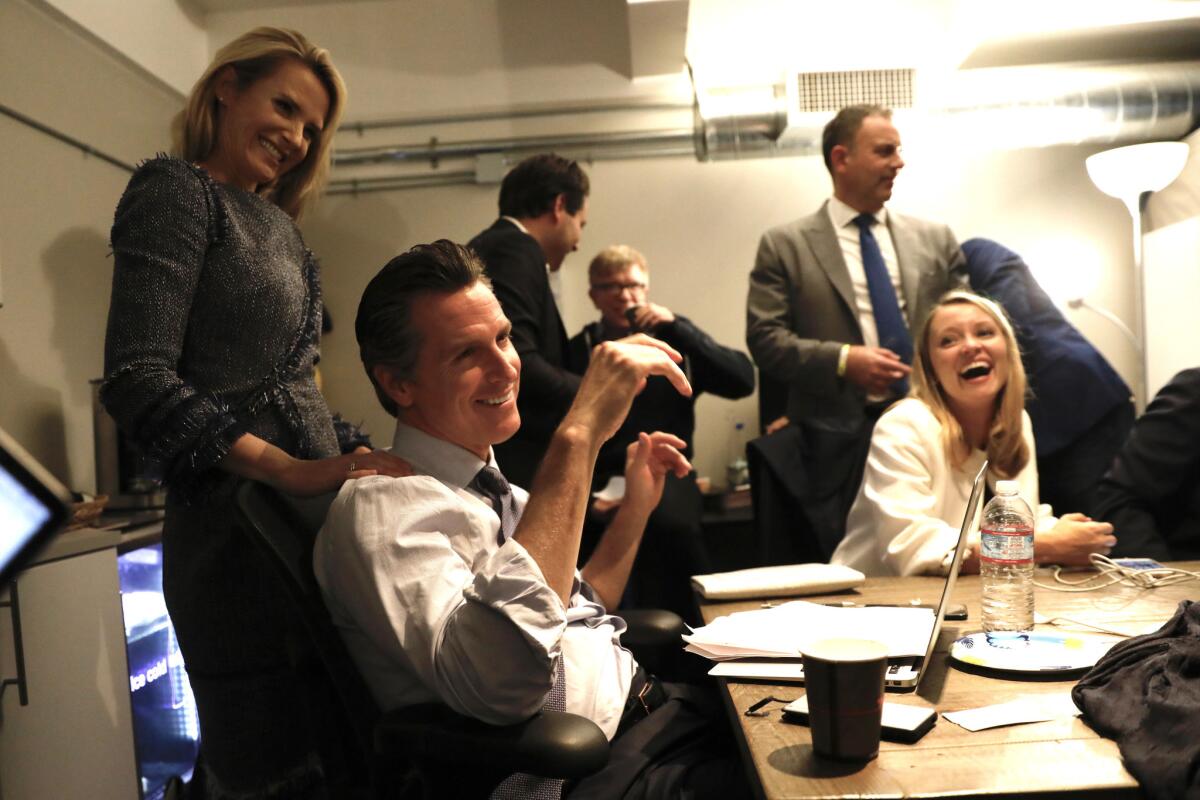
Basking in his first-place finish in Tuesday’s election, Gavin Newsom looked to November, casting the next phase of the election as a referendum on President Trump and California’s future.
“This is not a victory speech,” Newsom told supporters gathered at a San Francisco nightclub Tuesday evening, but the lieutenant governor was nevertheless triumphant in his primary performance and having drawn a Republican, Rancho Santa Fe businessman John Cox, as his opponent in the fall.
“In politics today, there’s too much anger,” Newsom said. “Instead, we offered answers. Resistance with results.”
Newsom did not mention any of his opponents, including fellow Democrat Antonio Villaraigosa, by name. But Newsom, who made no secret of his desire to face a Republican in November, oriented his comments toward Cox and the contrast with the national Republican Party.
“We are engaged in an epic battle. And it looks like voters will have a real choice in November: between a governor who will stand up to Donald Trump, and a foot soldier in his war on California,” Newsom said.
The lieutenant governor also signaled the policy themes he is likely to focus on as the campaign continues: affordability, healthcare and children’s poverty.
Newsom paid homage to the current governor, Jerry Brown, and his fiscal stewardship of the state — jokingly referring to rapper Kendrick Lamar’s hit “Be Humble” to characterize what it would be like to follow Brown. But he also painted California’s current reality in less-than-rosy terms, lamenting the state’s “unjust equilibrium of economic and wealth inequality.”
“The California dream cannot be truly realized until every Californian is sharing in it,” he said. “It’s about equity. It’s about sustainability. And it’s about time.”
- Share via
Villaraigosa endorses Newsom, says he looks forward to taking his new wife on a honeymoon
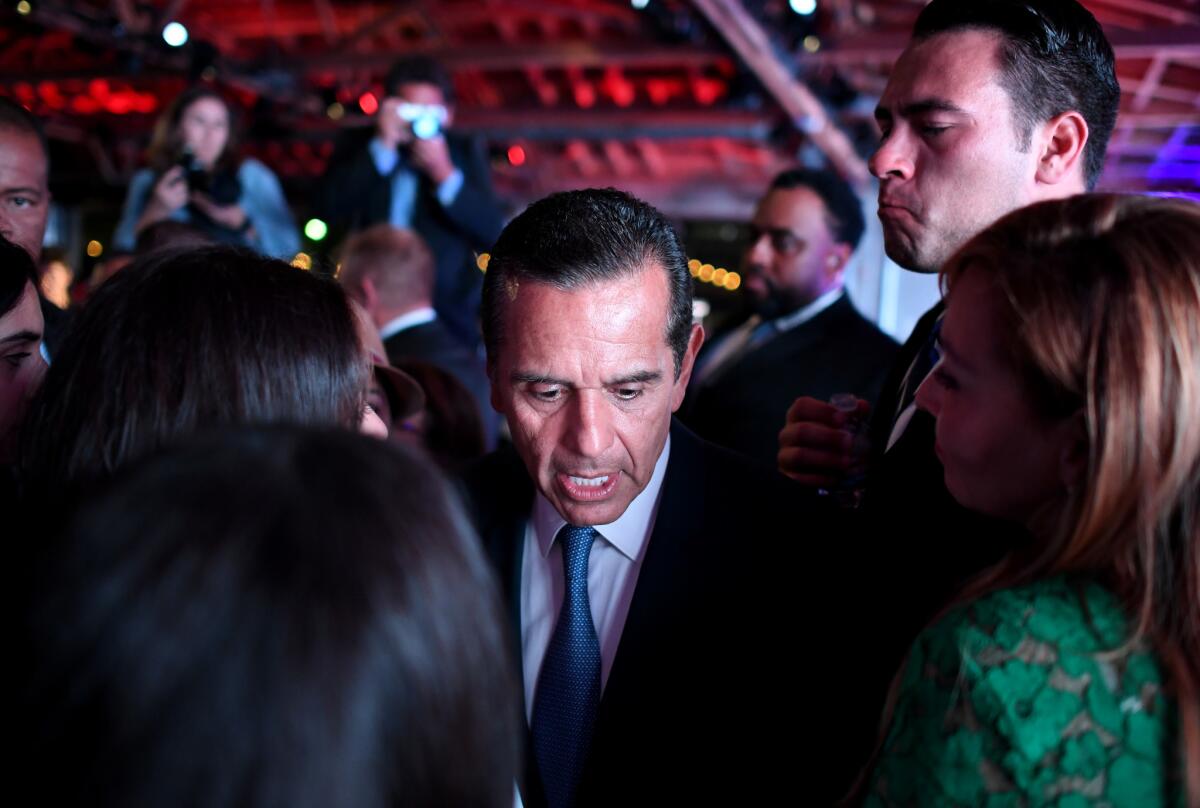
Antonio Villaraigosa conceded the gubernatorial race Tuesday night and endorsed fellow Democrat Gavin Newsom, with whom he bitterly clashed during the election.
“I’m asking you to get behind Gavin Newsom,” Villaraigosa said, surrounded by his family. “I’m asking you to stand up and pressure every one of us – Democrat and Republican alike – pressure every one of us to stand up for you, to fight for you, not just for ourselves, but for all of us, for an America and a California where every one of us are growing together.”
Villaraigosa also thanked Republican John Cox, saying that though they are from different parties and have different worldviews, it was important to acknowledge people who care enough about their communities to run for office. Cox beat Villaraigosa for the second spot and will compete with Newsom in the general election.
Less than four hours earlier, his campaign was urging Los Angeles County voting officials to keep polls open through Friday due to an error that left more than 118,000 voters’ names off the rolls at polling places. But there was no mention of the request as Villaraigosa addressed supporters at around 11 p.m.
He spoke of the opportunities that California had afforded him and his family, but warned that supporters must tackle the housing affordability crisis, the state’s high rates of homelessness and poverty, and the economic divide that is increasing the gap between the well-off and the middle class.
In addition to his campaign team, children and other family members, Villaraigosa thanked wife Patricia Govea. The two married in 2016 a few months before the former L.A. mayor officially launched his gubernatorial campaign.
“I’m a newlywed and I’ve been in the campaign my entire new marriage, and so we get an opportunity to actually have a honeymoon,” Villaraigosa said.
He appeared to be in good spirits, concluding, “Thank you, everybody, we’re done. But you know what? Never, never miss an opportunity to celebrate life, love and family. So enjoy the evening.”
The party space quickly cleared out, and workers began dismantling the stage.
- Share via
Rep. Steve Knight won’t know his challenger in L.A. County’s 25th Congressional District for awhile
Rep. Steve Knight (R-Palmdale) won the most votes Tuesday, but he won’t know whom he will face in the November election anytime soon. Knight is attempting to keep his place as the last GOP incumbent representing an L.A. County-based district.
Knight, first elected in 2014, has been viewed as one of the most vulnerable incumbents in Congress.
Bryan Caforio, who is challenging Knight for the second time, had been considered the favorite early on in the primary race. With fewer than 15% of precincts reporting results, Caforio barely led fellow Democrat Katie Hill for the second slot. Hill’s dynamic fundraising and backing from abortion rights group Emily’s List has added to her momentum in recent weeks.
Knight, who was out-raised by his challengers for much of the year, still had a comfortable lead in cash on hand as of mid-May with more than $1 million in the bank, more than three times the amount either Caforio or Hill reported.
He will probably need to spend much of that as Republicans fight to keep control of the Antelope Valley district, where the GOP holds a less than 5% voter registration advantage and which Hillary Clinton won in 2016.
Still, Knight is battle-tested in this swing district, having beaten Caforio by 6 percentage points in 2016 despite receiving less than 50% of primary votes that year.
Expect this race to see plenty of outside spending as November approaches: Emily’s List has made it clear Hill is one of their priorities to make gains in female members of Congress, and the national congressional committees for both Republicans and Democrats spent a collective $4.3 million fighting over the 25th District in 2016.
- Share via
It’s still a guess who will take on GOP Rep. Dana Rohrabacher in Orange County’s 48th District
Congressman Dana Rohrabacher secured the top spot in his race Tuesday, but it’s still unclear who will take on 15-term incumbent this fall.
With about half of precincts reporting, three candidates were locked in a very close battle: Democrats Hans Keirstead and Harley Rouda and Republican Scott Baugh.
The conclusion of a wild primary that left Democrats fearing they’d be left with no nominee in the Orange County district could be long delayed as votes are counted this week.
Of the several California races where that were an existential threat to Democrats’ chances of retaking the House, the risk was most acute here. That’s because Rohrabacher, under increasing scrutiny for his off-the-wall comments and friendly stance toward Russia, has seen his support with local Republicans erode in recent months.
This left an opening for Baugh, the former chair of the Orange County Republican Party, to vie for the second-place spot and shut Democrats out completely.
The problem was exacerbated on the Democratic side, which had eight candidates on the ballot, three of whom dropped out too late to remove their names, including Emily’s List-endorsed Rachel Payne. The Democratic Congressional Campaign Committee attempted to consolidate support behind real estate investor Rouda, an awkward move given that the California Democratic Party had endorsed stem cell researcher Keirstead.
Democratic groups also spent more than $2.7 million attacking Baugh and even dropped six figures to support a little-known Republican challenger in hopes that they could ensure one of their own got through. Conservative PAC American Future Fund and an affiliated group spent more than $700,000 in that effort.
Going into November, Rohrabacher will have to step up his lackluster fundraising — he has been out-raised by Baugh and several well-funded Democratic opponents for much of the primary — or rely on national groups to spend on his behalf.
- Share via
Rep. Jeff Denham advances to general election in 10th Congressional District
- Share via
California Sen. Josh Newman seems headed for removal from office for supporting higher gas tax
Voters appeared to approve the recall of a Southern California state senator Tuesday, with significant support for removing Sen. Josh Newman (D-Fullerton) from office in all of the counties in his district.
With 100 out of 484 precincts in Orange, Los Angeles and San Bernardino counties reporting, Newman appeared headed for defeat in the District 29 recall election. Republican challenger Ling Ling Chang appeared slated to replace the freshman legislator based on the early returns.
- Share via
Cox takes second spot in California primary race for governor
John Cox, a multimillionaire Republican hitched to the far-right policies of President Trump, won the second spot in California’s primary for governor Tuesday night, and will face Democrat Gavin Newsom in the November general election.
The results mark a stunning defeat for former Los Angeles Mayor Antonio Villaraigosa, representing the fall of a politician who embodied the growing power of the Latino electorate when he was elected mayor in 2005.
Cox, 62, an Illinois transplant and real estate investor, previously ran for Congress and the U.S. Senate twice in the Midwest, failing to reach the primary in all three. In 2008, Cox also launched a campaign for president before dropping out when he failed to get any traction.
Cox poured nearly $5 million into his bid for governor, but his political fortunes grew considerably when Trump fired off a tweet endorsing him in the final weeks of the campaign.
The combination propelled Cox past Villaraigosa in the race for the second spot on the November ballot, thwarting the former Los Angeles mayor’s efforts to stitch together support from enough Latinos, moderates and lower-income Californians to finish in the top two.
- Share via
Villaraigosa tells supporters that he expects it to be a late night before election results are clear
Antonio Villaraigosa repeatedly told supporters Tuesday that it would be a long night before the election returns in the governor’s race were clear.
“Growing up in this town, a town that’s given me so much, no matter what happens tonight — and we’re looking at a good night — but no matter what happens tonight, this town has blessed me and my family,” he told a few hundred supporters in downtown Los Angeles. “That’s why I wanted to run for governor. I wanted to stand with the notion to whom much is given, much is required... But it’s going to be a long night.”
Villaraigosa took the stage at the City Market Social House just as Democratic rival Gavin Newsom clinched first place in the contest. Villaraigosa is battling with Republican John Cox for the second spot, which will determine who faces Newsom in the general election.
Villaraigosa made no mention of his rivals but said early returns were what his campaign anticipated, and that his base of support, Los Angeles, votes in person on election day.
He also told the crowd about errors at Los Angeles County polls that resulted in more than 118,000 voters’ names not being on the rolls. Those voters should have been given provisional ballots, but Villaraigosa said his campaign has heard reports that some did not receive them. Earlier, his campaign requested that voting be extended through Friday.
“So over the course of the next day or two, until we figure this out, we won’t cast aspersions, but we will demand answers,” he said.
Until Villaraigosa mentioned the errors, voters at his party seemed largely unaware of the issue and were optimistic about his chances for coming in second as they mingled, grabbed tacos and pizza from food trucks parked outside and visited several bars set up around the property.
“We just have to keep up our positive energy,” said Teana Herrera, 50, who was unaware of the errors at county polling places.
Herrera, a transgender health advocate, said she was supporting Villaraigosa because he has stood with the LGBTQ community. She took out her phone to show a picture of Villaraigosa marching in a parade with the St. John’s Well Child and Family Centers’ transgender health program.
“He was not only for this community, he was for the undocumented community and the public in general,” Herrera said.
- Share via
Californians appear poised to reject measure controlling how climate change funds are spent
Four statewide ballot propositions were headed toward passage in California on Tuesday, while an effort to control how future funds collected through the state’s climate change program appeared headed toward a defeat early in the evening.
Proposition 70 would require both houses of the Legislature, six years from now, to approve spending of cash collected from the cap-and-trade program, in which industries pay for greenhouse gas emissions above the state-imposed cap.
With fewer than 15% of precincts reporting, the measure had 39% voting yes and 61% voting no.
- Share via
Machines for blind voters repeatedly failed when California woman tried to vote
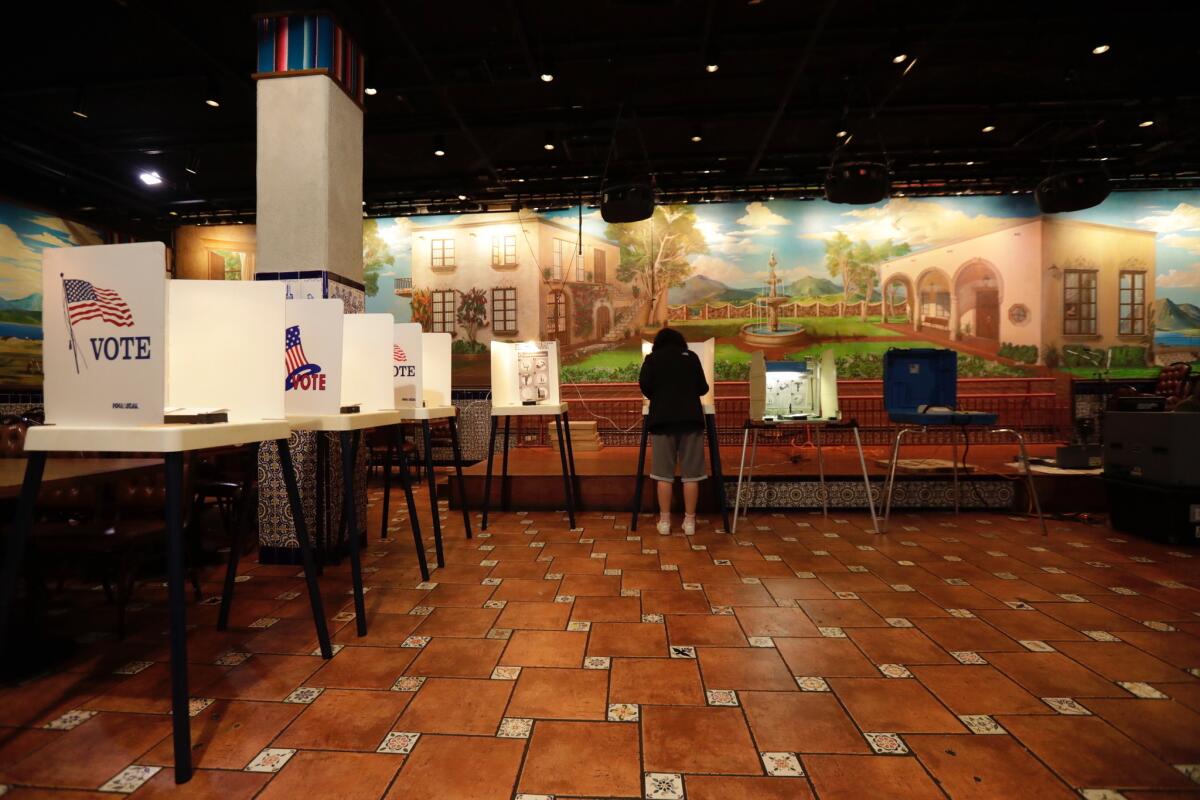
Voting is supposed to be pretty easy. You show up, poll workers confirm you’re registered to vote, you cast a ballot, and you leave. Simple.
But Miso Kwak’s attempts to vote in Tuesday’s primary election turned into a complicated morass as L.A. County voting machines designed to help blind voters repeatedly failed to work at one polling station after another — thwarting Kwak and well-intentioned poll workers alike.
Kwak, 23, of Diamond Bar, who said she is nearly totally blind and can’t read print, has previously successfully used the county’s audio ballot booth technology, in which voters can listen to ballot text on headphones and cast votes using arrow buttons.
But at her first polling location Tuesday, at Maple Hill Elementary School, the booth failed to work, Kwak said. A poll worker then offered to drive her to another polling place, Chaparral Middle School — where the ballot booth technology also failed, Kwak said.
The poll worker then drove Kwak to a third location, at a church, where the technology also apparently failed, Kwak said.
“The poll workers there did put a lot of effort into [getting] this resolved,” said Kwak, adding that the county officials they called also “made an effort.”
Kwak had to leave for an appointment, and then returned to Maple Hill Elementary School several hours later, which had received a new assisted voting machine. It also didn’t work, Kwak said.
Ultimately the poll worker who drove her around earlier helped her cast a ballot, Kwak said.
Kwak said she was grateful for the help of poll workers and county officials who tried to resolve the technology problems, but she thought it was important to raise public awareness about the struggles faced by some voters who are blind.
“We should be able to vote independently and privately just like any other people,” Kwak said. “Even if it’s just one person who had this one problem today … it’s something that shouldn’t happen to any other person, including myself, again.”
The Los Angeles County Registrar-Recorder/County Clerk’s office didn’t respond to a request for comment.
- Share via
Gavin Newsom takes first place in California primary for governor
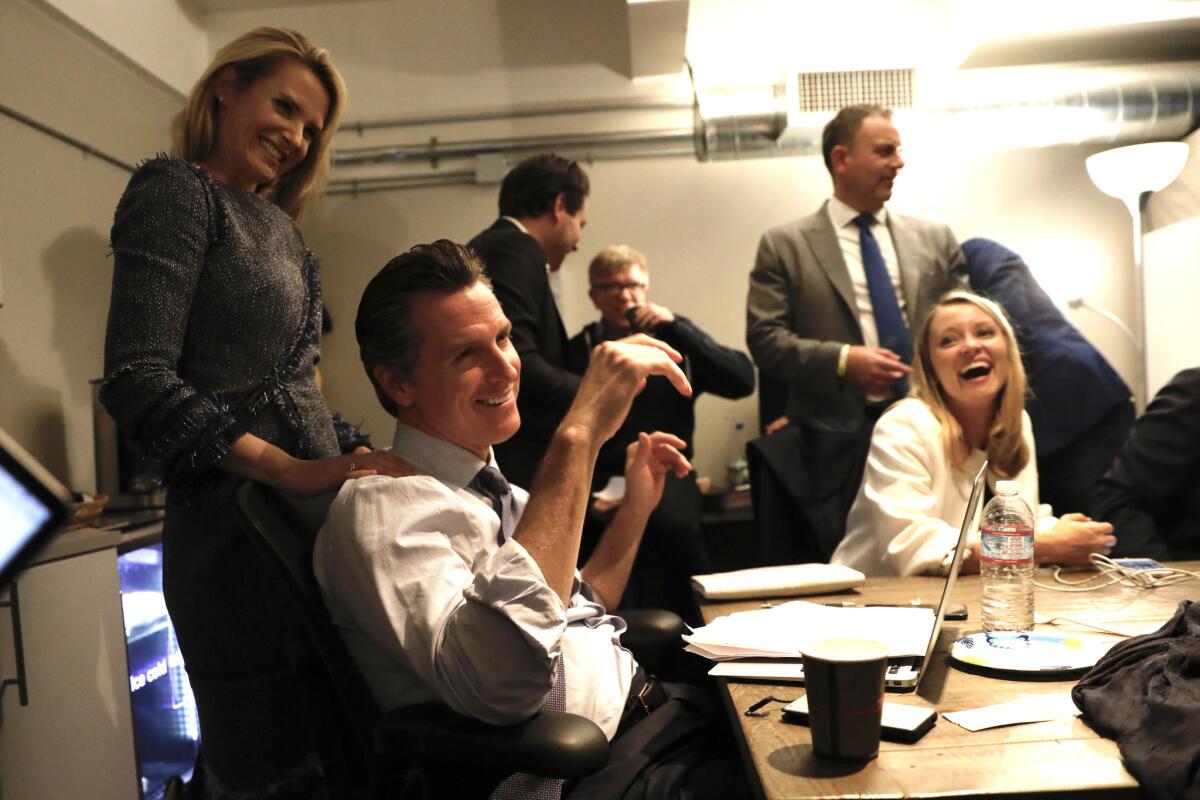
Gavin Newsom, the favorite of the California Democratic Party’s core liberal base, won first place in Tuesday’s primary election for California governor, but the fight for the second spot on the November ballot remained too close to call in early returns.
Rival Democrat and former Los Angeles Mayor Antonio Villaraigosa and Republican businessman John Cox both appeared to be within reach of finishing in the top two, with far-right GOP Assemblyman Travis Allen also in the mix.
Cox poured nearly $5 million into his bid for governor, but his political fortunes really brightened when Trump fired off a tweet endorsing him in the final weeks of the campaign.
After a five-year hiatus from political office, Villaraigosa hopes to recapture the magic that led to his two terms as mayor of Los Angeles. To do so, he needed to stitch together support from enough Latinos, moderates and lower-income Californians to finish in the top two.
- Share via
Rep. Mimi Walters advances to general election in 45th Congressional District
- Share via
Villaraigosa calls for extending election day through Friday after more than 118,000 L.A. County voters’ names left off rolls
Antonio Villaraigosa called on elections officials Tuesday to extend election day until Friday because of errors that led to the names of more than 118,000 voters not appearing on the rolls in Los Angeles County.
“It should be infuriating to voters,” Villaraigosa told reporters at his election night party in downtown Los Angeles. “You would expect that in the United States of America, in the county of Los Angeles, they would be able to conduct an election without there being problems of this magnitude.”
He said his campaign had filed requests with county elections officials to extend voting, and has asked Secretary of State Alex Padilla to investigate how the errors occurred. He said they have not yet received a response.
The former Los Angeles mayor, who is in a tough fight for second place in the gubernatorial primary, is counting on support from his home base. He declined to say how he thought the voting errors could affect the results, but predicted a long night before the results are known.
Addisu Demisse, a spokesman for Villaraigosa’s Democratic opponent, Lt. Gov. Gavin Newsom, said he did not believe leaving polls open would would materially affect the outcome of the governor’s race, but said the campaign wanted everyone to be able to vote and noted it could be important for down-ticket races.
“Whatever in the bounds of the law is acceptable to allow more people to vote, we’re for it,” he said.
- Share via
GOP Rep. David Valadao, Democrat TJ Cox advance in bid for Central Valley’s 21st District
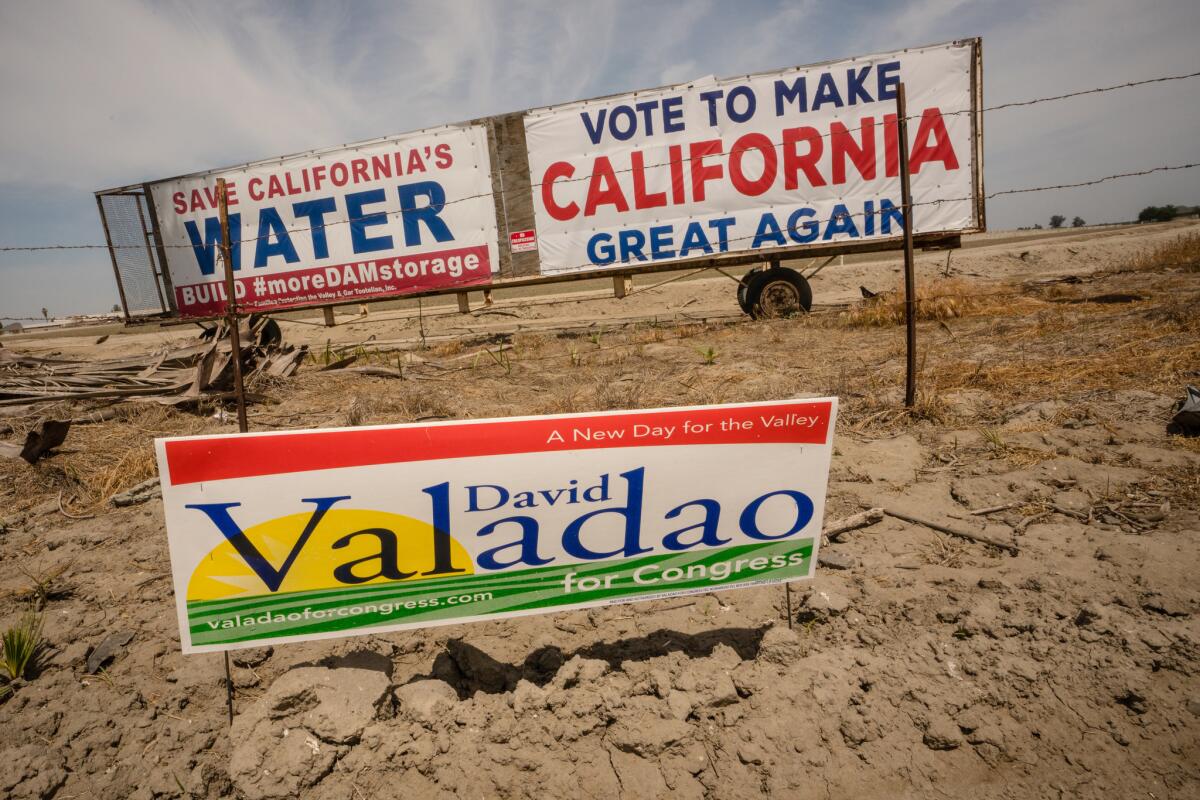
Republican Rep. David Valadao advanced to the general election along with his sole opponent, Democrat TJ Cox, on Tuesday.
Cox, an engineer and businessman, jumped into the race late. He replaced Bakersfield lawyer Emilio Huerta as the only Democrat on the ballot. Huerta dropped out in March, having raised little money and campaigning sparingly. Cox had originally planned to run against neighboring GOP Rep. Jeff Denham.
Though voter registration in their congressional district leans heavily against Republicans — Democrats have an 18-percentage-point advantage — Valadao outran President Trump by 16 percentage points and even Hillary Clinton by 2 percentage points. Democratic candidates have struggled to turn out support because of ineffective campaigns and low voter turnout.
Huerta, son of civil rights icon Dolores Huerta, lost by 13 percentage points to Valadao in 2016.
Cox has raised more than $500,000 as of mid-May and is being supported by the Democratic Congressional Campaign Committee’s “Red to Blue” program, which provides resources to some candidates in competitive districts. Valadao has raised about $1.7 million.
Both candidates have grappled with recent lawsuits. Cox and his wife were slapped with an IRS tax lien in unpaid income tax last year. He told the San Jose Mercury News it was because of a bureaucratic mistake.
Valadao faces a lawsuit on charges that his family farm defaulted on over $9 million in debt.
Like other Republicans in the Central Valley, Valadao has attempted to gain some distance from the president. He and Denham have broken with their party in an attempt to force votes on bills to overhaul the nation’s immigration system. But Trump’s presidency has thrust attention on their otherwise GOP-aligned policy preferences, which opponents say are deeply mismatched with the needs of their constituents.
- Share via
In the heart of the Trump resistance, so much apathy in California
Sure, it’s just a primary.
And the general election is five months away.
But is that reason enough, in a state that has screamed its political resistance loud and clear, to sleep through an election?
- Share via
Sen. Dianne Feinstein advances to November election, but her opponent is still to be decided
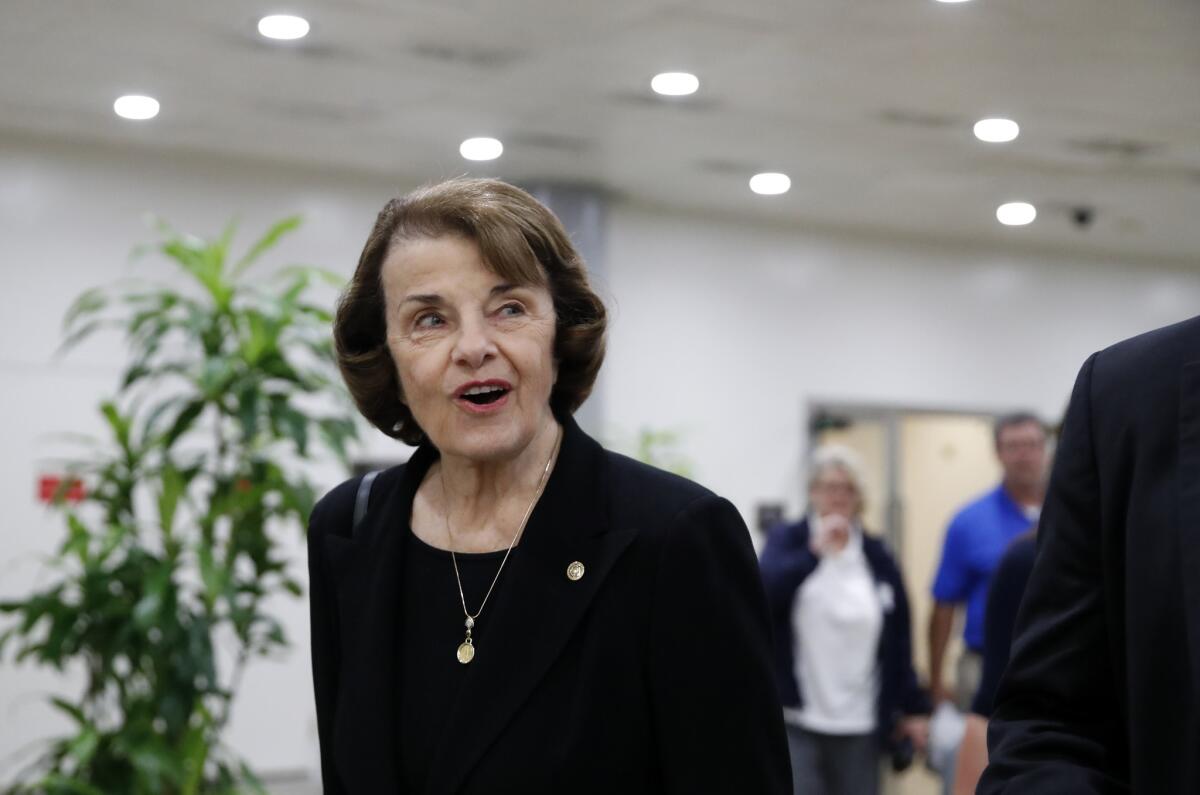
Voters overwhelmingly chose Sen. Dianne Feinstein in the California primary Tuesday.
Feinstein was long expected to secure a spot on the November ballot in her campaign for a fifth full term in the U.S. Senate, and the Associated Press called the race not long after polls closed Tuesday evening.
The question remains who Feinstein will face in November, as votes for the other 31 candidates were still being tallied Tuesday.
State Sen. Kevin de León is the most likely to earn the second spot in California’s top-two primary. He has dominated the polls while challenging Feinstein from her left. A handful of late polls have seen increasing support for a little-known Republican, James P. Bradley of Laguna Nigel, raising the specter of a Republican edging De León out of the race.
Feinstein, 84, already is the longest consecutively serving California politician. If reelected this fall, she would be among the oldest people to ever serve in the Senate.
Check out some of our previous coverage on the Senate race:
Why centrist Dianne Feinstein is moving so much to the left that she now opposes the death penalty
Kevin de León’s plan to take on Dianne Feinstein starts with finishing second
California Democrats’ snub of party icon Dianne Feinstein could be a speed bump — or a signal
- Share via
Get live analysis of California primary results
Times journalists are holding a live chat as we watch California primary results. Join us for analysis, observations and maybe even a few jokes along the way.
- Share via
On the beach, a cross section of California’s divided electorate
They were out for a morning stroll, or about to hit the surf, and that was about the only thing they had in common.
The Californians in Huntington Beach on Tuesday morning were scattered in their support for candidates on the primary ballot.
Patti Rummel said she supported Democrat Harley Rouda in the crowded 48th Congressional District race because she wanted to back the person who seemed to have the best chance at getting enough votes to prevail in California’s top-two primary, which advances the top two vote-getters regardless of party. Republican Rep. Dana Rohrabacher is seeking reelection and Scott Baugh is the leading Republican challenger on the ballot, along with a number of Democrats.
Rummel, a 56-year-old homemaker from Huntington Beach, said she made her decision to vote for Rouda with help from the local Indivisible group. Should one of the other Democrats make it to the November ballot (a big if at this point), she said she would support that person.
“My primary goal is getting Dana out,” she said.
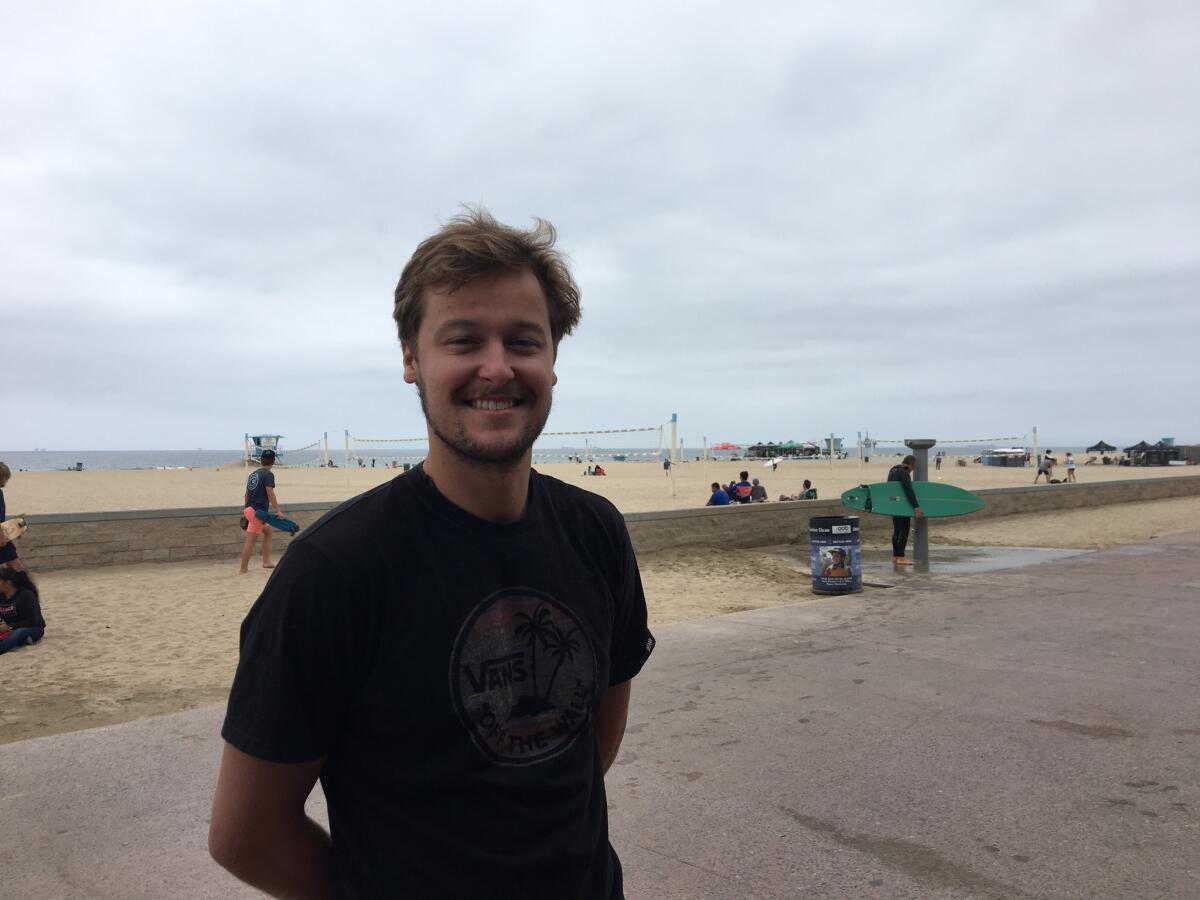
Just down the beach, a group of Hans Keirstead supporters infiltrated a live television show on MSNBC. Keirstead is among the other Democrats on the ballot.
Eric Nummedal, 25, of Costa Mesa said he is backing Keirstead because he is a fellow scientist and Congress “has a need for reason and rationality,” especially on his top issue of global warming. If his candidate gets shut out, Nummedal will back Rouda or another Democrat, he said. But if his party is eliminated completely in November, he is at a loss for what to do.
“If it’s two Republicans on the ballot, that’s very concerning,” Nummedal said.
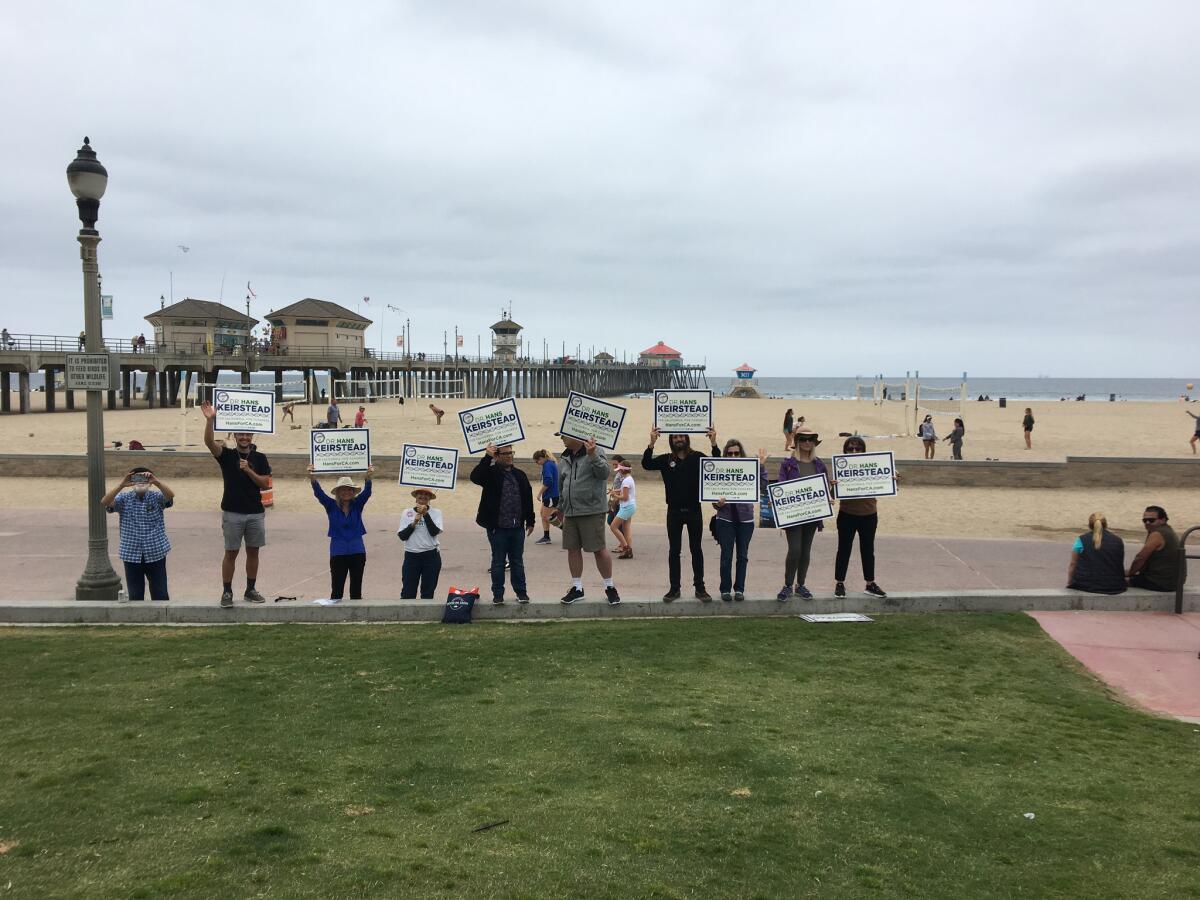
Ingrid Bruder, who met her son in the parking lot to go surfing before heading to the polls to vote, is backing the incumbent congressman. She said she believes Rohrabacher is doing a good job, but acknowledged that she doesn’t closely follow politics.
She is especially torn about the contest for governor but was leaning toward a vote for businessman John Cox, who was recently endorsed by President Trump. Her top concern is illegal immigration, said Bruder, a 48-year-old stay-at-home mom from Newport.
Should no Republican prevail and end up on the fall ballot in the gubernatorial race, she would be upset, because “I’m struggling with how Democratic California has become.”
Dana Weiser, 64, said he was able to go surfing Tuesday because he’d voted the day before.
Weiser, an electronic technician from San Pedro, said he voted for Gavin Newsom for governor because he is against the oil drilling process of fracking and wants something done about the homeless crisis. He also backed state Sen. Kevin de León in his attempt to unseat U.S. Sen. Dianne Feinstein.
In the case of Brian Chastain of Westminister, he leaves the voting up to his wife. He said he didn’t know enough about the candidates or the issues and didn’t want to exacerbate the state’s problems. Chief among them, he said: “People who vote and don’t know things.”
“There are a lot of irresponsible votes from younger people,” Chastain said.
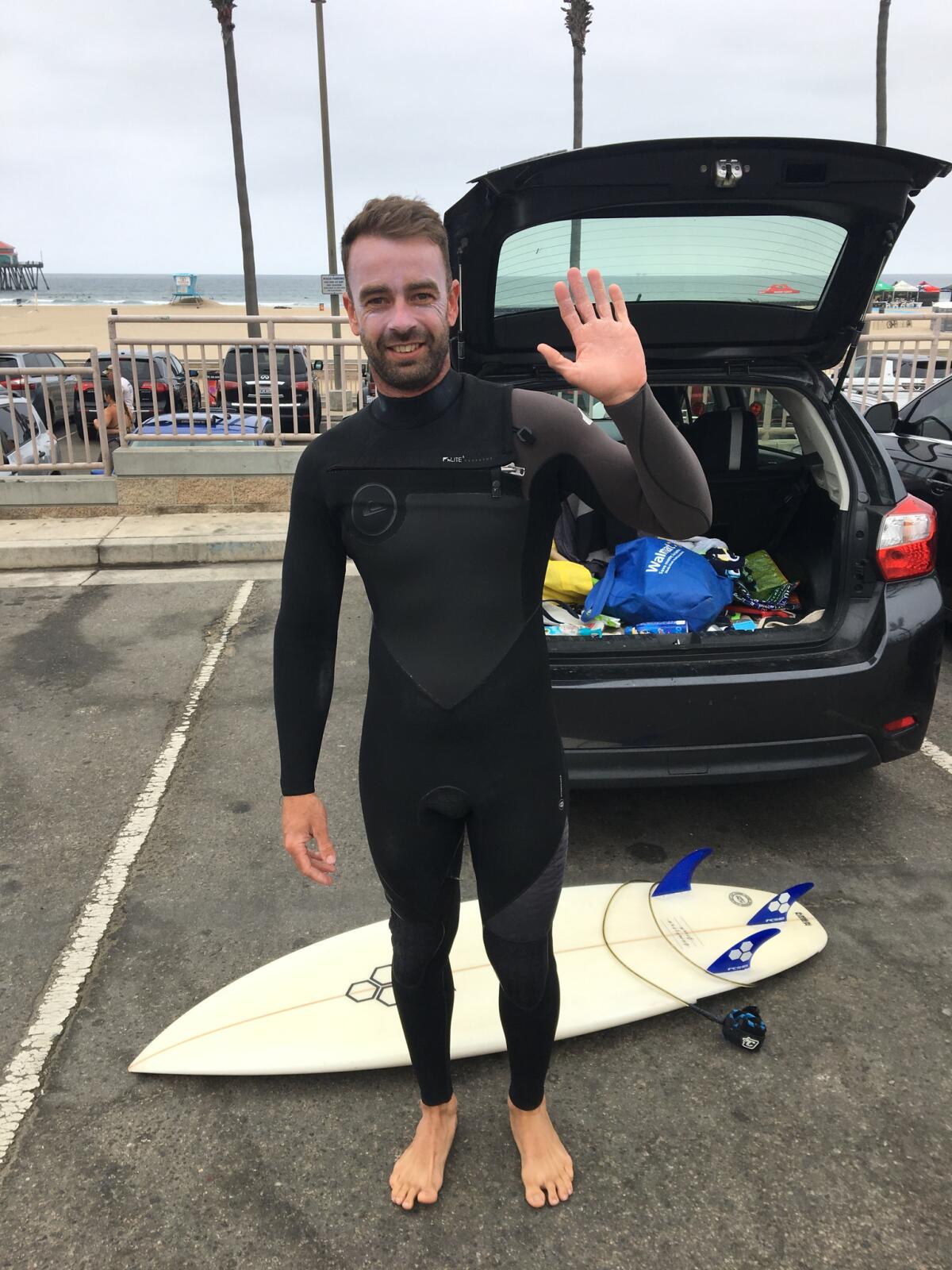
- Share via
118,522 voters accidentally left off Los Angeles County polling place rosters
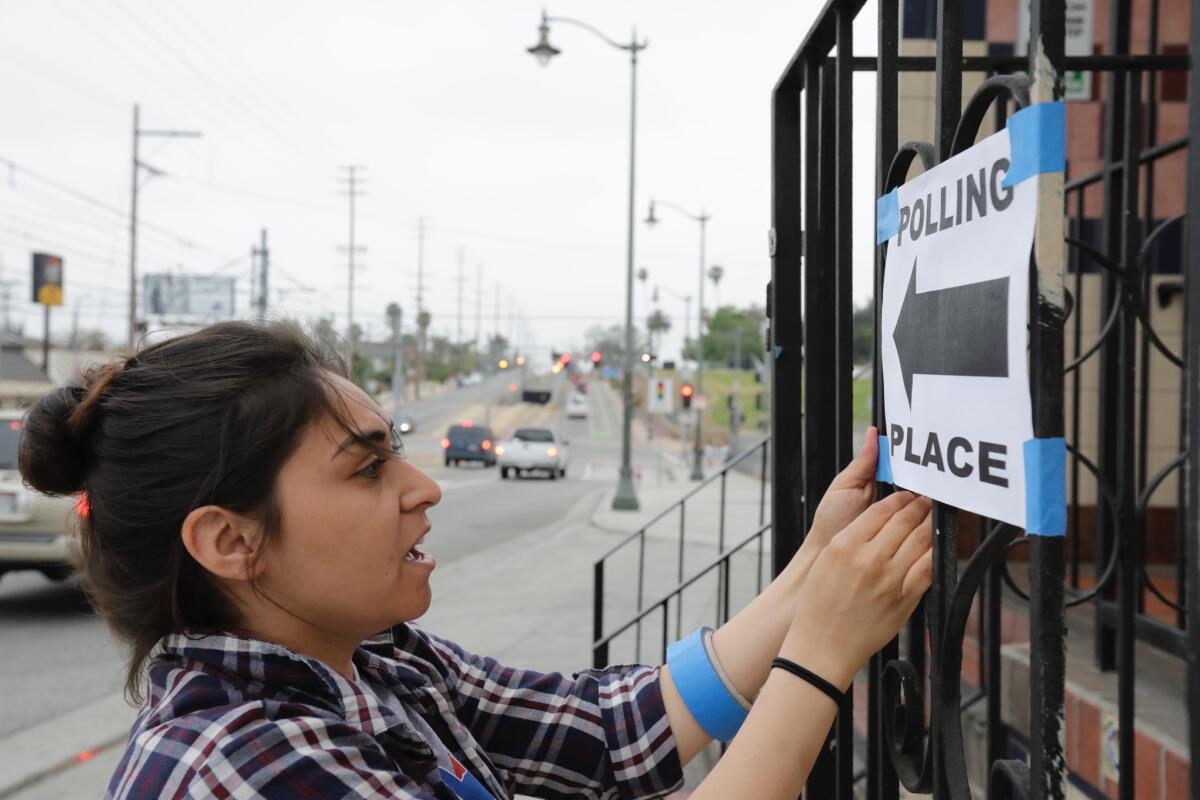
If you are a registered voter in Los Angeles County and poll workers say they can’t find your name on the roster at the polling place when you go to vote, don’t worry — you can still cast a provisional ballot.
Some Angelenos needed a bit of reassurance that their votes would be counted in Tuesday’s primary election after 118,522 voters’ names were accidentally left off rosters due to a printing error, according to L.A. County Registrar Dean C. Logan.
About 2.3% of L.A. County’s 5.1 million registered voters and 35% of the county’s 4,357 precincts were affected by the error, according to figures provided by the registrar-recorder/county clerk’s office, which was still trying to determine the reason for the printing error. Voters whose names are missing are being encouraged to file provisional ballots, which are verified by vote counters later.
“We apologize for the inconvenience and concern this has caused,” Logan said in a statement. “Voters should be assured their vote will be counted.”
Erin Faulk, 35, brought a mail-in ballot to her Glendale polling station hoping to swap it out for a regular ballot, fearing that a vote worker misreading the signature on her mail-in envelope might mistakenly throw out her ballot.
But when Faulk arrived, her name wasn’t on the polling place roster, even though she said she voted in the 2016 presidential election and double-checked to confirm her registration status.
“I think I talked to five different people there” at the polling station while trying to sort through the issue, and “they finally said ‘Look, we just have a lot of people who just aren’t showing up on here,’” Faulk said.
While she was at the polling station, about four out of the 10 other voters who arrived were also told their names weren’t on the roster there, Faulk said.
In the end, Faulk decided to vote using her mail-in ballot instead of casting a provisional ballot, which she similarly feared might not be counted due to some kind of technical glitch.
“At that point, I don’t think it really matters that much,” Faulk said.
- Share via
Gov. Jerry Brown promotes Proposition 68 in Facebook ad
Learn more about the five statewide propositions here.
- Share via
California Republicans in most tough House races aren’t sticking around for results
Most of California’s vulnerable incumbents will watch primary election returns tonight from Washington, if they stay up to watch them at all.
Reps. Dana Rohrabacher (R-Costa Mesa) and Mimi Walters of Irvine plan to stay in California to watch the returns. Reps. Steve Knight of Palmdale, David Valadao of Hanford, Jeff Denham of Turlock and Duncan Hunter of Alpine will travel back for votes, according to their staffs.
The House schedule — set by a fellow Californian, Majority Leader Kevin McCarthy of Bakersfield — has them voting on seven noncontroversial bills, including a tweak to the route of a national scenic trail in Minnesota and a waiver of permit fees for veterans groups who want to demonstrate on federal land. Such routine votes are often held on the first night of the House work week. Many vulnerable lawmakers were in Washington on primary day in 2016 as well.
The first votes of the week are scheduled for 3:30 p.m. Pacific. To make it across the country in time, many of them will need to leave Monday night or Tuesday morning.
Sen. Dianne Feinstein will also watch the returns from her home in Washington, while her chief opponent, fellow Democratic state Sen. Kevin de León, will watch from downtown Los Angeles.
Democrats have officially targeted 10 of California’s 14 Republican-held seats this year. Two incumbents, Reps. Darrell Issa of Vista and Ed Royce of Fullerton, chose not to run for reelection.
UPDATE
4:24 p.m.:
This post was updated with news that Walters decided to stay in Orange County for primary night. Her staff initially said she planned to be in Washington, D.C.This post was originally published at 8 a.m.
- Share via
Legislative contests are first tests of #MeToo at the California ballot box
The accusations of sexual misconduct, followed by resignations, tore through Sacramento last fall as the #MeToo movement began to rock institutions of power around the nation.
Now, roughly half a year after the first scandals hit, voters are being asked to replace two ousted legislators and decide the fate of another two who refused to walk away from politics despite the graphic accusations made against them.
Democrat Tony Mendoza, who resigned from his state Senate seat amid misconduct charges, and Assemblywoman Cristina Garcia, whose accuser has appealed a sexual harassment investigation that found his claim to be unfounded, are both facing a horde of challengers. Their districts each cover parts of southeast Los Angeles County.
- Share via
Selfies and cheeseburgers: How Gavin Newsom spent election day
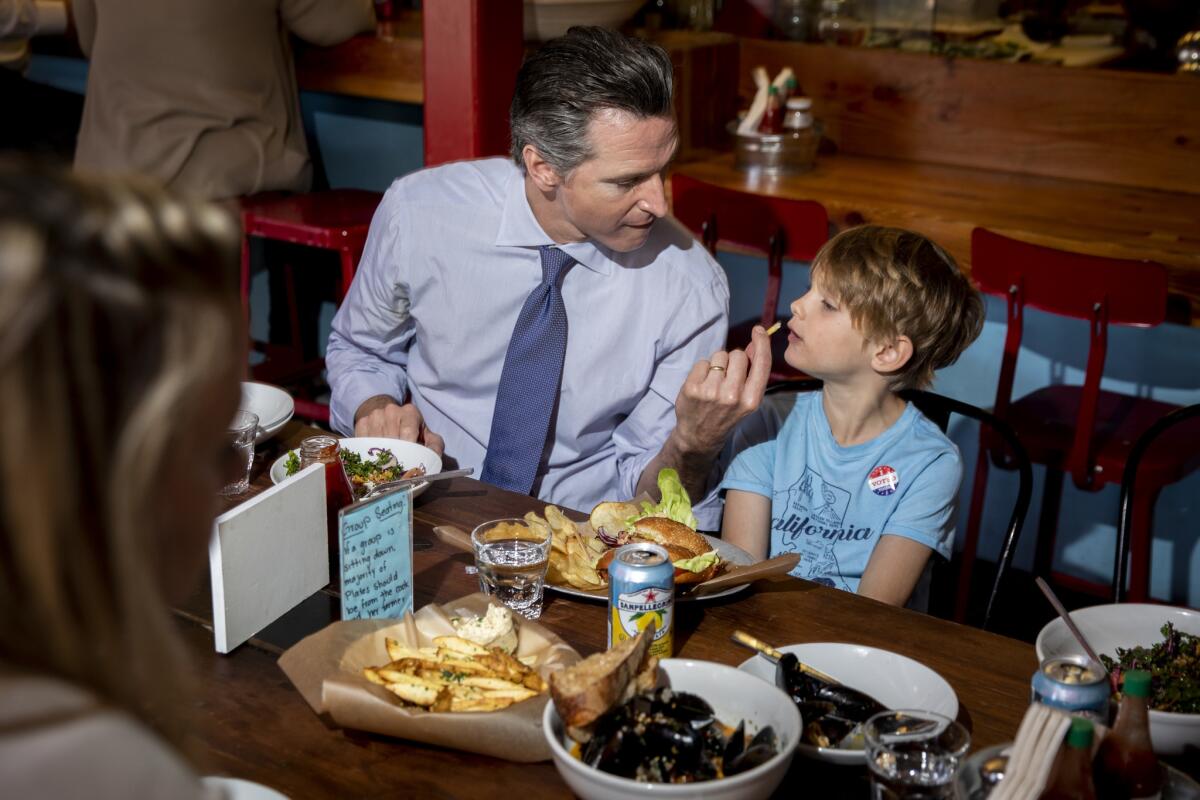
Looking to juice turnout in his home turf, Gavin Newsom spent his final public appearance before the polls close Tuesday at an upscale Oakland food court taking well-wishes and the occasional tough policy question.
And selfies. Lots of selfies.
“At this stage, we just need to get our voters out through the day,” Newsom told a local TV news reporter Tuesday afternoon. He added: “We’re here in Oakland — a big part of our base, it’s the Bay Area.”
Newsom was joined by his wife and three of their four children, as well as Oakland Mayor Libby Schaaf, who, like Newsom, has publicly clashed with President Trump over immigration and other policies.
This was friendly territory for Newsom. Diners were mostly interested in offering brief “good luck” wishes and securing a photo. But the lieutenant governor and his family were left largely undisturbed as they ate their lunch of kale salads, cheeseburgers and fries — and an Arnold Palmer for Newsom.
One Oakland resident, Kalima Hanible, approached as Newsom finished his meal to lob a question: What was the candidate’s agenda for the black community? Newsom first responded with a dig at Trump and his clash with the Philadelphia Eagles, before turning the question back to Hanible on the biggest issues facing black Californians, asking the 33-year-old about police-community relations and his studies in accounting at a local community college.
Hanible said afterward that Newsom “made a good impression. He seems like a good man.”
“I didn’t quite get an answer” on his question about Newsom’s agenda, Hanible said, but wasn’t too put off.
“It’s something to work on,” he said, adding that he intended to vote for Newsom later in the afternoon.
Salvador Alba, a 22 year-old waiter, chatted with Newsom and his wife, Jennifer, about his work at the restaurant. The one-on-one time worked to Newsom’s advantage.
“Their intentions are 100%,” said Alba, an Oakland resident.
He said he was intrigued by former Los Angles Mayor Antonio Villaraigosa, who is vying to be California’s first Latino governor in modern history.
“California has such a big population of Latinos. He would understand where my community came from,” Alba said. Nevertheless, the meeting with Newsom “swayed me a little bit,” he said.
- Share via
Voters make their picks in races for 7 statewide offices
While the contest for governor is drawing more attention in Tuesday’s election, there are seven other statewide races also on the ballot, including a barnburner between state Atty. Gen. Xavier Becerra and three challengers over who will be California’s top cop.
Becerra was appointed by Gov. Jerry Brown more than a year ago after the previous office-holder, Kamala Harris, was elected to the U.S. Senate. A former 12-term congressman, Becerra is in his first statewide election and is facing challengers including fellow Democrat Dave Jones, the state insurance commissioner.
The Republican candidates for attorney general are retired El Dorado County judge Steven C. Bailey and Los Angeles private attorney Eric Early.
- Share via
Get to know the top candidates running for California governor
Still on the fence about who to vote for in today’s primary election for California governor?
Get to know six of the top candidates, and learn about where they stand on several big issues.
Huntington Beach Assemblyman Travis Allen, Republican
State Treasurer John Chiang, Democrat
Rancho Santa Fe businessman John Cox, Republican
Former California Superintendent of Public Instruction Delaine Eastin, Democrat
Lt. Gov. Gavin Newsom, Democrat
Former Los Angeles Mayor Antonio Villaraigosa, Democrat
Where the candidates for California governor stand on the state’s biggest issues
- Share via
Photos: Californians go to the polls
- Share via
Here are the California House races that will make a difference
Democrats consider 10 Republican-held districts here to be battlegrounds and likely can’t retake control the House without winning at least a few of them.
Taking multiple factors into account, The Times’ California politics editors have ranked the hottest races by the intensity of the fight ahead.
- Share via
Today’s the day for Democratic House candidates in California
Voters in California’s key House districts are poised Tuesday to determine match-ups that could make or break Democrats’ chances of taking back the House this fall.
The most pressing concern for Democrats is whether their wide, boisterous field of candidates means the party will be locked out of multiple races thanks to the state’s top-two primary, which advances the two candidates with the most votes regardless of party.
The prospect of voters only having the choice between two Republicans on the ballot in crucial races in November has forced Democratic groups to spend more than $7 million in the closing weeks of the campaign to avert disaster.
“Tuesday’s primaries in California are obviously taking all of our attention because of how big the stakes are,” said Meredith Kelly, a spokeswoman for the Democratic Congressional Campaign Committee.
- Share via
A whole lot of money has been spent on California House races so far
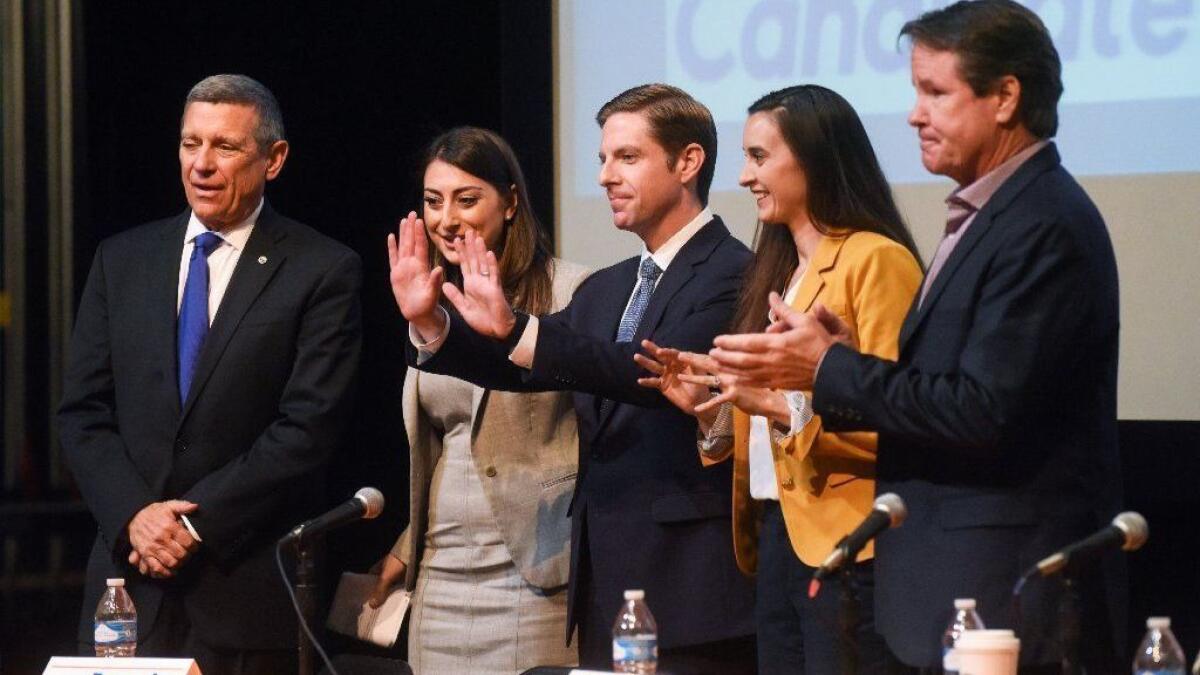
California’s competitive crowded House races are getting pricey — more than $108 million has been spent so far this cycle to help elect candidates to Congress, double what was spent in the last primary election cycle.
The eye-popping figures are thanks, in part, to the state’s complex top-two primary election system. With a number of seats up for grabs while Democrats are hoping to wrest control of the U.S. House, the races have been combative and expensive.
- Share via
A voter guide for the California primary
Welcome to a special Tuesday edition of Essential Politics.
As people in the political business are fond of saying, the only poll that matters is the one taken on election day, so it’s very exciting that it has formally arrived. Of course, people have been voting for nearly a month, and it might take the rest of the week — or more — to count votes, but you get the idea.
First things first: Stick with the Los Angeles Times and we’ll have you covered with everything you need to know. We’ll have live election results and a special primary news feed capturing everything that happens throughout the day and after the polls close.
- Share via
Here’s exactly how California’s unique primary works
California’s much discussed top-two primary election is happening today, and it could lay the groundwork for Democrats to take back the U.S. House. Or not.
The way it works is pretty simple: Instead of separate party primaries, all the candidates are on one ballot, and the top two vote getters advance to the November general election, no matter their party affiliation. That means two candidates from the same party can — and sometimes do — end up as the only candidates in the general election.
Don’t call it a jungle primary — that’s in Louisiana. And when the two finalists in each race advance to November’s general election, don’t call it a runoff: No one can win outright Tuesday, even if they get more than 50% of the vote.
Despite its apparent simplicity, the system injects a lot of uncertainty into races. It also prompts parties to do seemingly wacky things, such as fund attack ads against weaker challengers in hopes of consolidating votes for the opposing party’s front-runner while discouraging opposition turnout overall.
Read more about California’s top-two primary, its potential fallout and the high stakes. You can also watch this quick explainer video:
- Share via
Voters cast their ballots in Boyle Heights
- Share via
Confused about the propositions on your California ballot? We explain them all
There are five propositions in all, a small menu of proposed laws all written by the California Legislature. This is the fourth statewide primary held since Gov. Jerry Brown signed a law that moved voter-circulated ballot measures to November elections. More than a dozen are now vying for a spot on the state’s fall ballot.
- Share via
Polls are open in California: What you need to know
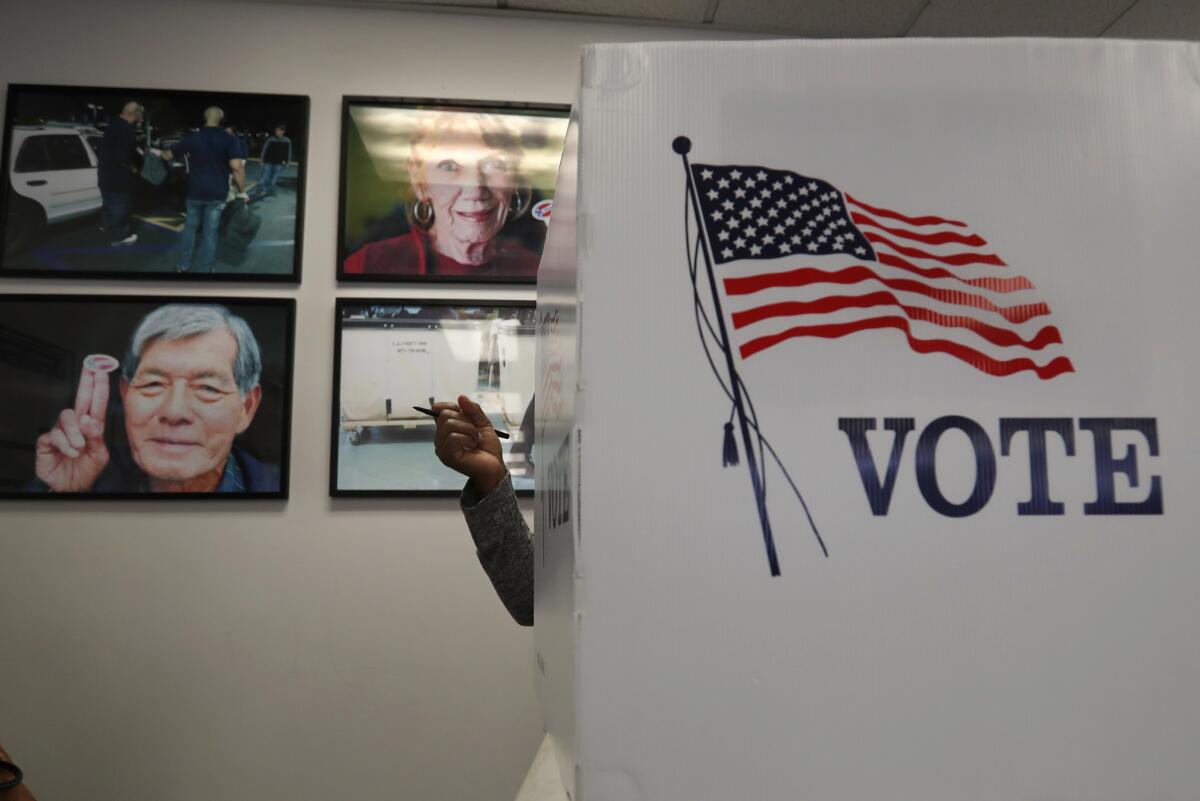
First, here’s how to find where to vote in California’s primary today (and you can register right up until poll closing time at certain locations.) Polls are open from 7 a.m. to 8 p.m. Read some quick rules about voting and registering.
The big things on the ballot:
• Who’s running for governor and what they think about the issues.
• There are 32 (!) Senate candidates on the ballot, but two leading ones — Democrats Sen. Dianne Feinstein and state Sen. Kevin de León.
• These are the important House races. They are so important, some of them might tip the balance of the House in November.
• All those races will be affected by California’s unique primary system.
• Here’s what those five ballot measures are about.
• Here’s who and what the L.A. Times’ editorial board endorsed.
• We will have updates throughout the day and tonight. You can find the results right here.
- Share via
Trump urges Californians to turn out to vote, and block Democrats from retaking the House
President Trump urged Californians to turn out to vote Tuesday morning, urging them to back Republicans and deny Minority Leader Nancy Pelosi the speakership in November.
Winning a few of California’s GOP-held House seats is critical to Democrats’ plan to retake control of the House, something that would likely mean Trump would have to deal with a Speaker Pelosi (D-San Francisco), rather than a Speaker Kevin McCarthy (R-Bakersfield) as he would prefer.
Trump also reiterated his endorsement of Republican businessman John Cox for governor.
- Share via
Some things to consider before you vote in California today
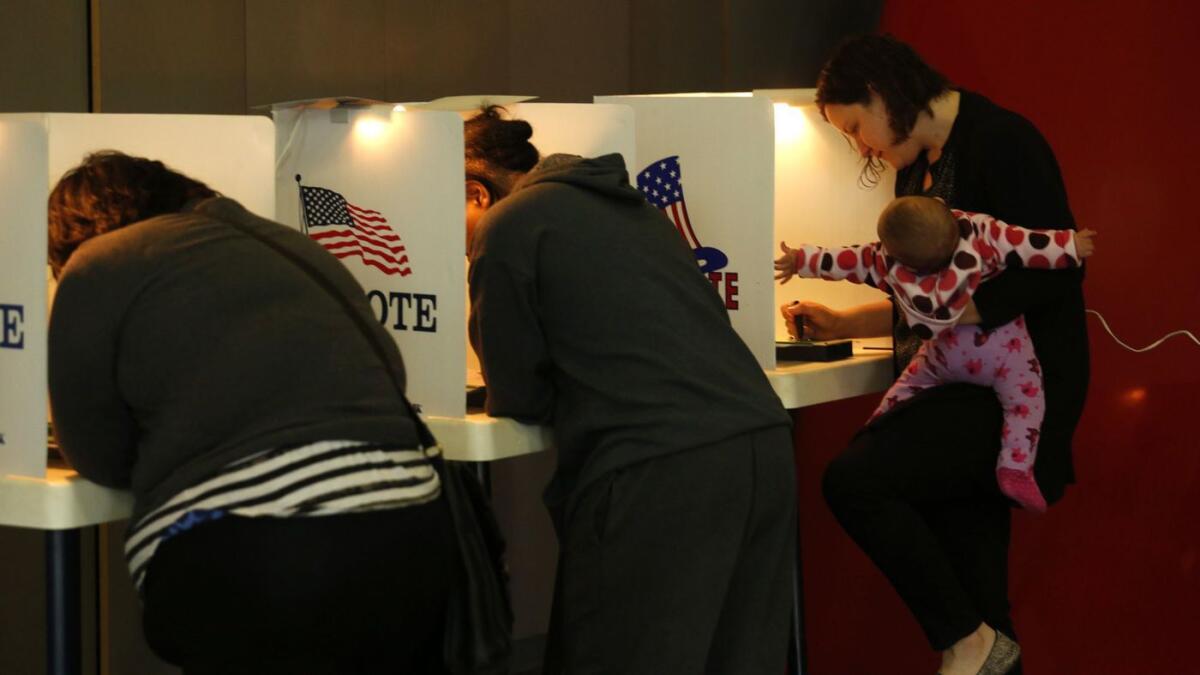
While millions of Californians have already mailed in ballots for the Tuesday primary, most registered voters are either still considering their choices or will weigh in at a local polling place on election day. In a few key areas, this election will be different from others. For one, you can still register to vote today.
- Share via
Here’s just a few of the crazy things that could happen today in California
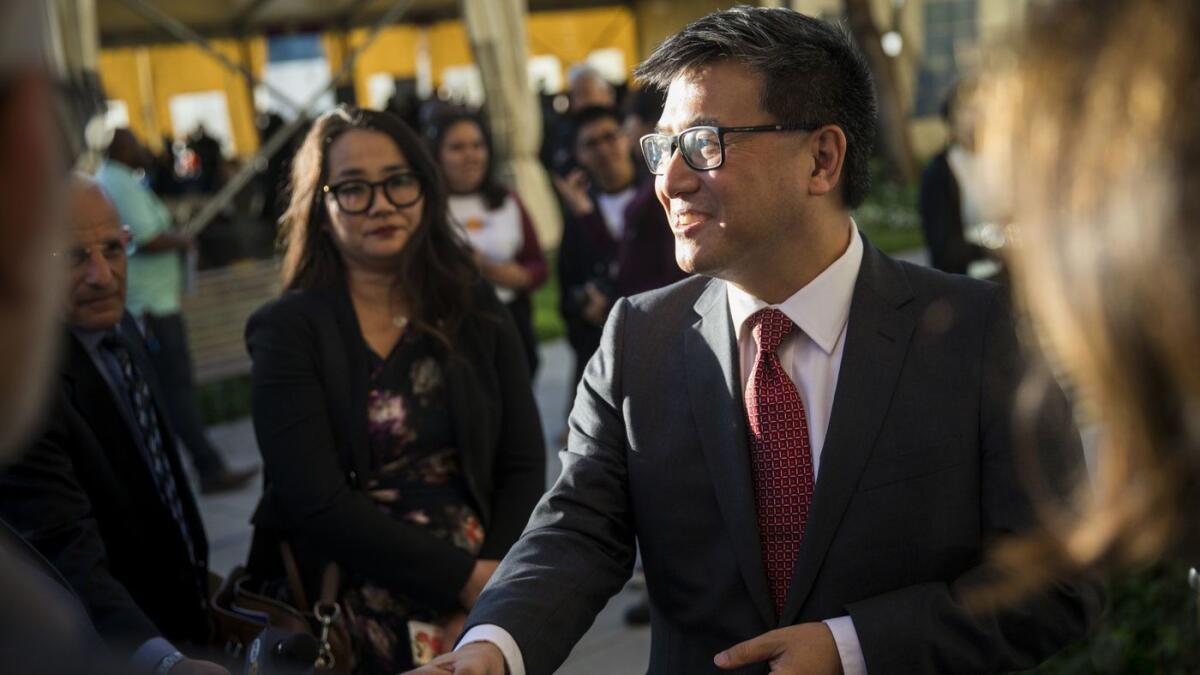
There are a lot of factors that make California’s Tuesday primary a potential font of surprises, not least the state’s unique primary system, in which the top two vote-getters advance to the November runoff regardless of party.
- Share via
What to look for in today’s consequential California primary
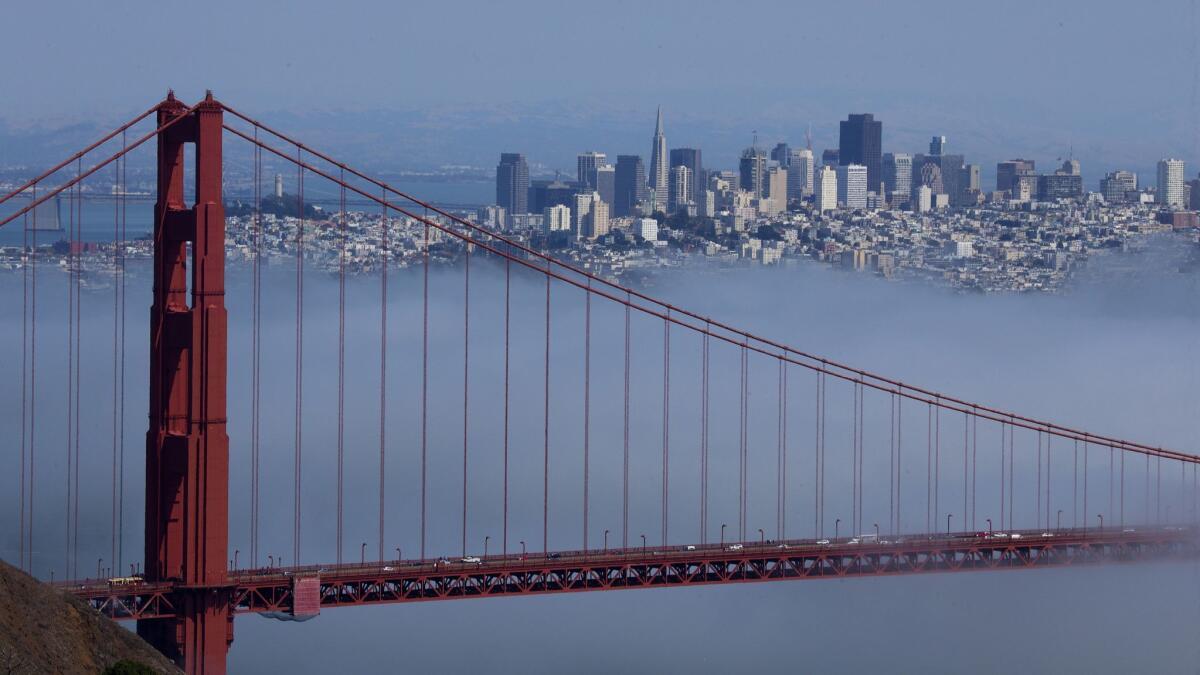
Polls close across California at 8 p.m. today, marking the end of one of the state’s most unconventional primary elections. Simply put, there has been a lot to watch.
As the returns start to come in tonight, a few snippets of electoral data are worth watching closely to better understand the story of this political season in the Golden State.